“As Pacific Leaders, our vision is for a resilient Pacific Region of peace, harmony, security, social inclusion and prosperity, that ensures all Pacific peoples can lead free, healthy and productive lives.”
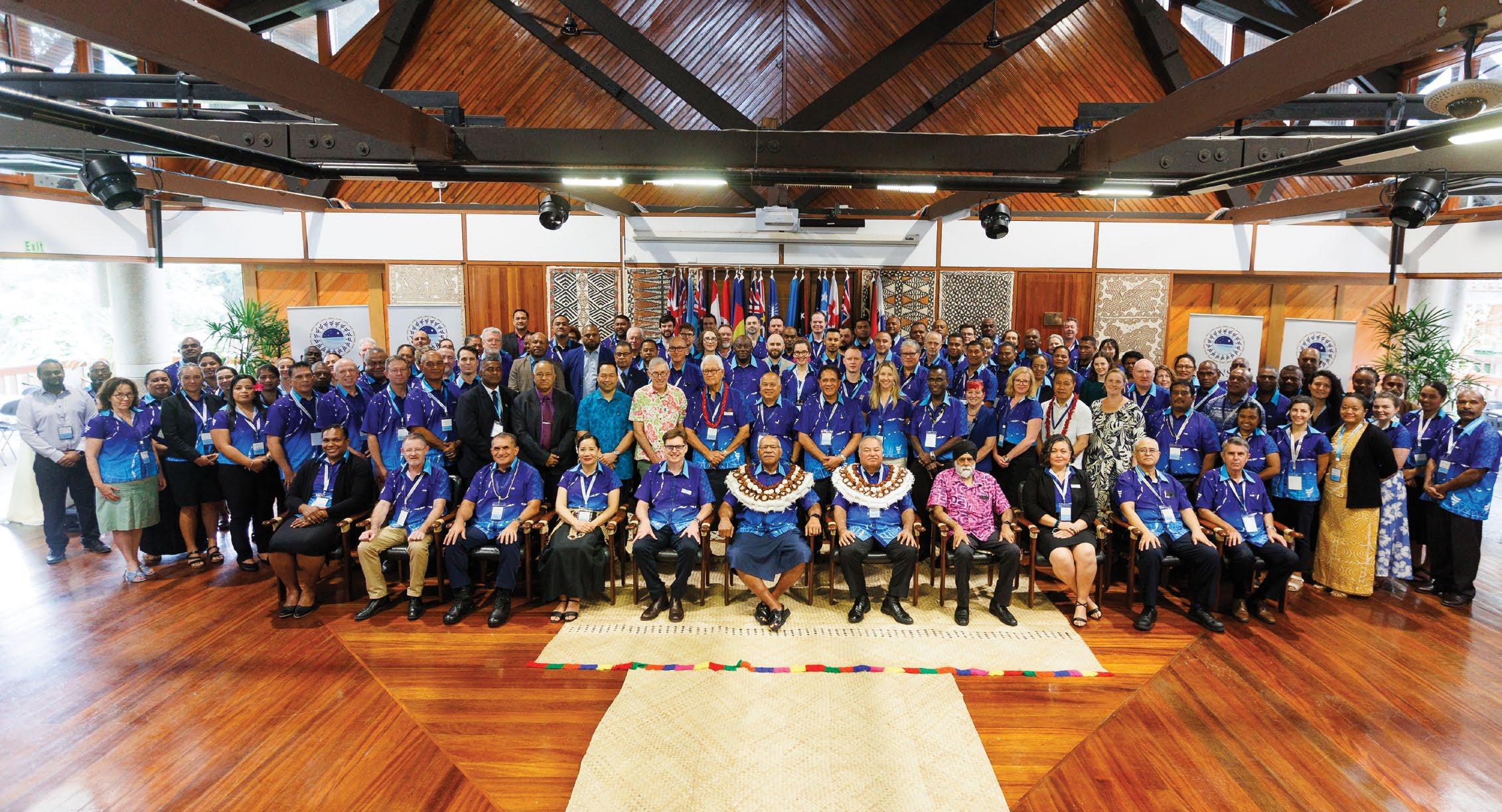


“As Pacific Leaders, our vision is for a resilient Pacific Region of peace, harmony, security, social inclusion and prosperity, that ensures all Pacific peoples can lead free, healthy and productive lives.”


Representatives from every Forum member gathered in Suva for the inaugural Pacific Regional and National Security Conference from 24-26 June.
Over the first two days we considered each of the topics in the Boe Declaration on Regional Security, and on the third day we discussed the pathway to 2050 for the Pacific to realise the hopeful future outlined in the 2050 Strategy for the Blue Pacific Continent.
The topics were serious, but there was good cheer and camaraderie as the members of the Pacific security community shared their stories and learnings.
My thanks and gratitude to the Pacific Islands Forum Secretariat and Government of Fiji for their kind and gracious hosting; the nine partner organisations who did everything to make the Conference work; the wise and clever moderators and panellists who taught us; and all the wonderful participants from the Pacific security community who reminded us that, whatever the future may hold, none of us are on our own.
This booklet is a souvenir of that happy gathering, and a resource that can hopefully continue to be useful reference. But more than that, it’s a reminder that we’re all in this together, and the future to 2050 is there to be won.
With much gratitude,

Professor Dave Peebles Director Pacific Security College
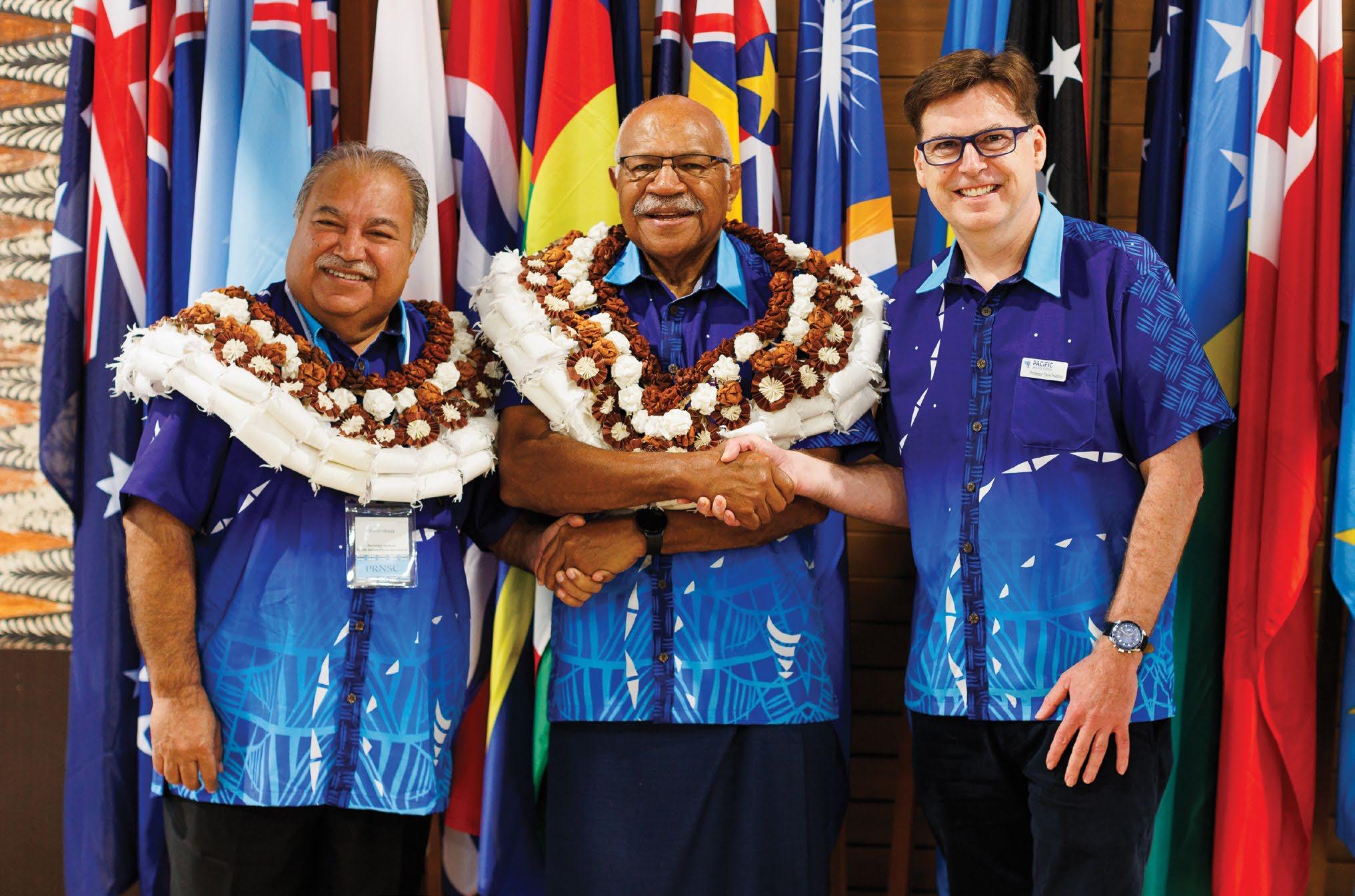




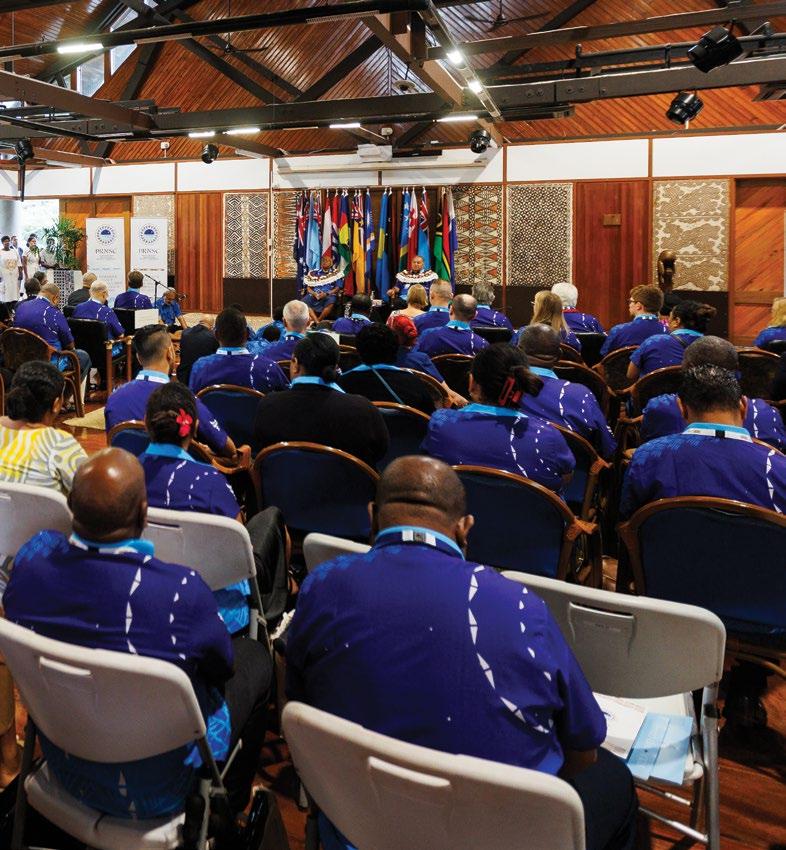

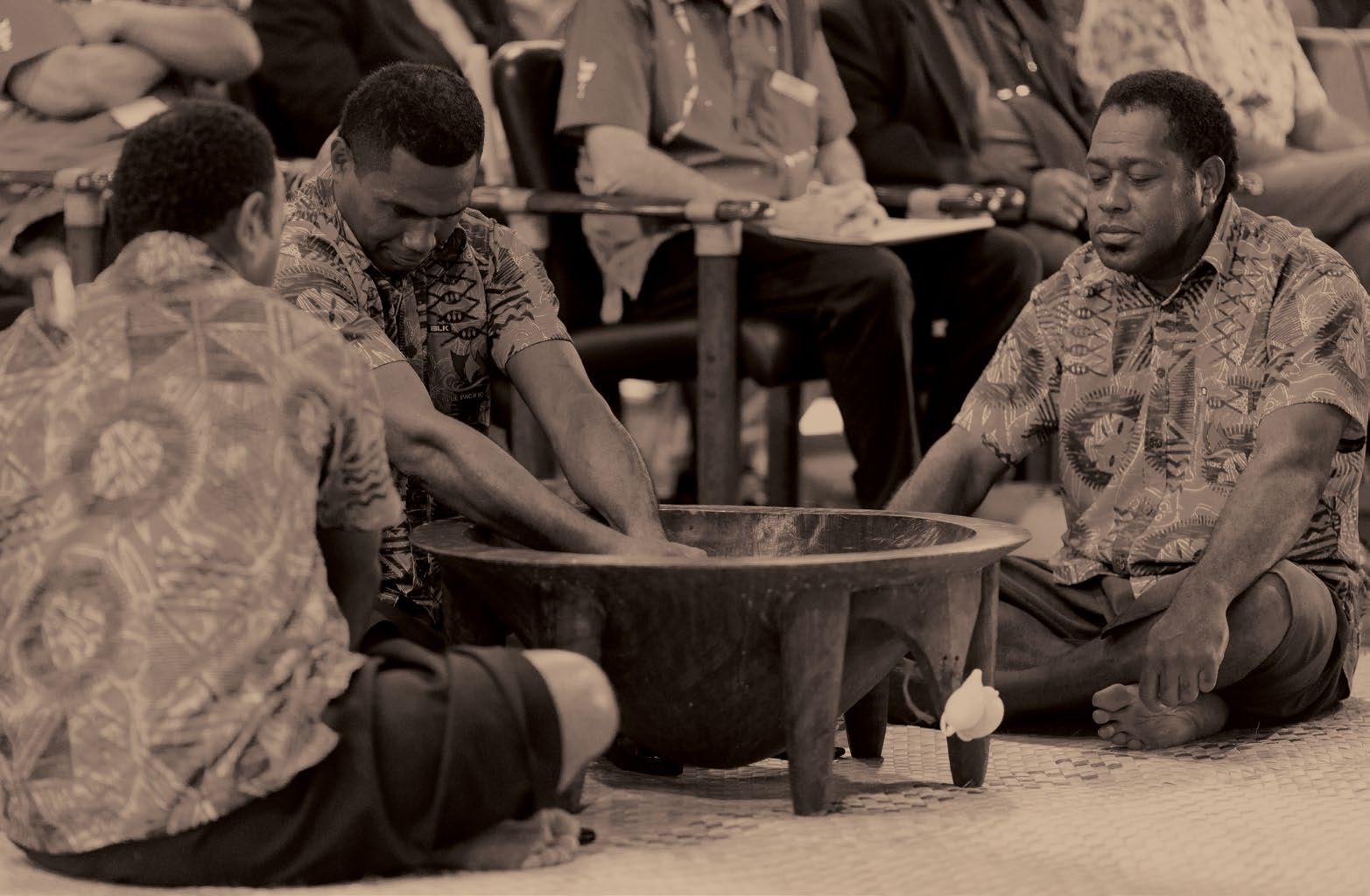

Prime Minister
The Honourable Sitiveni Rabuka Minister for Foreign Affairs, Climate Change, Environment, Civil Service, Information, Public Enterprises and Veteran Affairs
• Pacific Islands Forum Secretary General Baron Waqa
• Members of the Pacific Islands Forum, represented here by Heads of Mission and Senior Officials
• Representatives of our regional security organisations
• Sisters and brothers from the Pacific security community
• Academics and civil society representatives and other experts
A very warm welcome to everyone from the Pacific security community and beyond, gathered here in Suva for this Pacific Regional and National Security Conference!
Seeing everyone here highlights the strength and the solidarity of the Pacific security effort.
All of us can build peaceful and prosperous Pacific communities by cooperating and learning from each other.
My government is committed to building peace… at home, in the Pacific, and on the global stage.
This is why I am so pleased you have gathered, in a spirit of friendship and shared purpose, to also promote peace and security.
Because, sisters and brothers, when I think about the legacy I want to leave my children and grandchildren… we must, we must, work together to tackle the polycrisis before our great Blue Pacific.
I believe on Wednesday you will conduct a futures exercise, to consider the decades ahead to 2050.
How will we reach the future we want in 2050?
What legacy will we leave our children and grandchildren?
These are the most important questions.
To leave a good future, we are called to urgent action now.
Let me outline some aspects of this polycrisis before our great Blue Pacific, and how my government is responding.
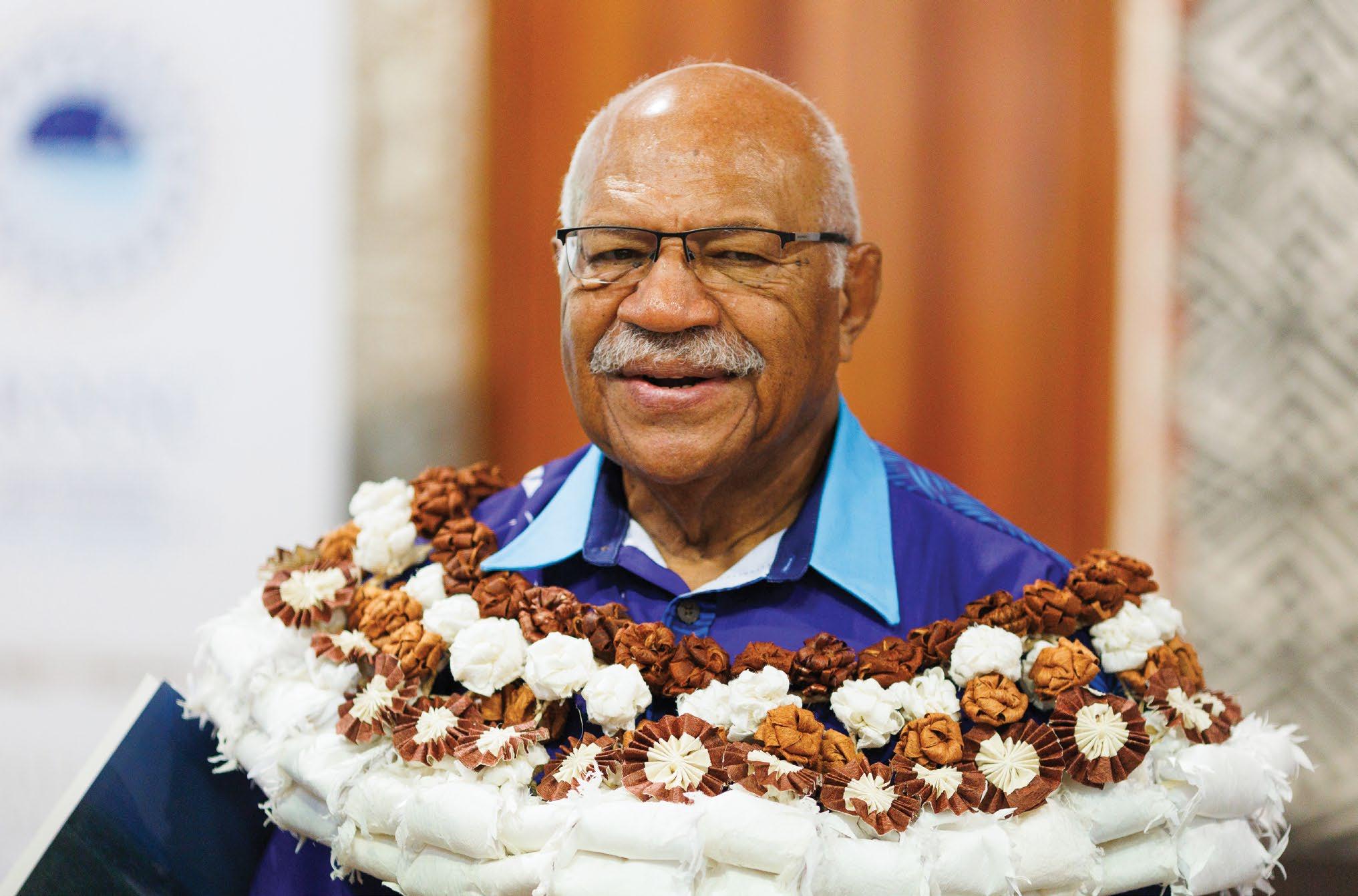

Like all of you, I remain very concerned about the existential threat climate change poses to our Blue Pacific.
The seasonal patterns our ancestors lived by are shifting rapidly, with more change ahead.
Here in the Pacific, the difference between 1.5 degrees and 2 or 3 degrees is not subtle. It is a knife’s edge.
It is the difference between the habitability of our island homes and forced migration.
It is the difference between catching your own fish, and growing your family’s food, or being wholly dependent on imported protein.
It is the difference between economic sovereignty, and fully fledged dependence on external aid and disaster relief.
The only way through is to work together, as this Conference demonstrates.
For Fiji, as our capacity allows, we will continue to deploy humanitarian and disaster relief to our neighbours, including for
• bush fires
• severe tropical cyclones
• earthquakes and
• tsunamis.
Please take the message back to your homes: Fiji stands with you.
Fiji, like all Forum members, also faces the challenge of protecting our waters against transnational organised crime.
Fiji, through the combined efforts of our border agencies, and the support of our partners, has carried out many drug raids in recent times.
The value of the drugs seized is estimated to be in the billions of dollars.
This is the reality Fiji faces as a hub and transit point in the Pacific.
We know that crime and criminal groups do not respect borders.
Rather, they manipulate borders in their business model.
Cyber criminals ignore borders all together.
These criminal groups can only be disrupted and dismantled by all of us working together.
I look forward to hearing the Conference’s ideas for how we can fight the scourge of transnational crime and drugs.
These challenging times also remind us of the importance of human security.
The “triple burden” of non-communicable diseases, mental health, and the climate emergency, are straining health resources everywhere.
The COVID-19 pandemic has also reminded us of the importance of biosecurity in our interconnected world.
We welcome this dialogue, bringing together expertise from across the Blue Pacific, to strengthen our approach to human security.
We see, too, the rules-based order that had provided stability for so long under threat.
The Pacific has become a geostrategic arena in the last decade or so.
A multitude of interests, many not in congruence with each other, collide.
There is no end in sight. And the chances of miscalculation are high.
This is why I have been advocating for the Blue Pacific to be declared an Ocean of Peace.
Together, we exercise sovereign authority over a very large part of the globe.
I believe it is fitting therefore that at a time of geo-strategic tension, economic uncertainty, and a changing climatic environment, we, who are the ‘custodians of the ocean’ welcome the proposal that the Pacific is an Ocean of Peace and agree to adopt a number of high-level principles,
to guide efforts to realise this ambition and embed peace as a cornerstone of future policies and strategies.
An Ocean of Peace must reflect The Pacific Way.
The concept recognises that whilst core values and a Pacific identify are shared across the region, local customs and understandings vary. Humility, quiet leadership, reconciliation and communication run through these definitions.
So whoever enters the Pacific region will be compelled to tone down and tune in to the ways of the Pacific.
The Ocean of Peace will be the Blue Pacific’s contribution to world order.
Our Blue Pacific region and our peoples will be the very emblems of peace.
My government has been working hard on developing the Ocean of Peace concept.
I will be presenting these ideas to my fellow Forum Leaders when we gather in Tonga in August for this year’s Forum Leaders meeting.
As we refine our proposal, I welcome the Conference’s ideas for how we can ensure the Blue Pacific is truly an Ocean of Peace.
I congratulate those countries which have decided to embark on the voyage of creating their national security strategies.
And I congratulate those countries which have decided to review their existing strategies because of new circumstances and new understandings.
Fiji is on this voyage too, through our National Security and Defence Review process.
This work is preceded by the development of Fiji’s first Foreign Policy White Paper which will define our values and interests.
From these bases we stand shoulder to shoulder with you as part of the Pasifika Vuvale, and how we will project ourselves to the world.
This strategy represents a pivotal step in our journey towards a secure, stable and prosperous Fiji.
Sisters and brothers, there is a great voyage ahead. We must build a great drua or waka together.
We must work together to safeguard our Blue Pacific for this generation and those to come.
We have our very own Pacific Way of Leadership to guide us. The Pacific Way reminds us of where we have been: our traditions, our languages, our cultural values, our faith; the things we must take into the future with us.
And the Pacific Way reminds us of where we want to go: of our care and concern for the next generation, and the world we want to leave for them.
We have the regional agreements, too, which bring us together for collective action.
We have the Boe Declaration on Regional Security, which declared the Pacific to be a region of peace. And we have the 2050 Strategy for the Blue Pacific Continent, our regional guide to the future.
As Secretary General Waqa said here, at his welcome ceremony on 14 June, we are a region which promotes stability and security with a culture of love and respect. The leaders who built our regional family house have been visionaries. If anything, their voices carry over the waves the message: we need each other more than ever.
And when I see all of your beautiful bula shirts, I am reminded of the stars which bind us as we go on these great voyages together!
Now, I want to leave you with one humble suggestion.
This Conference name of “Pacific Regional and National Security Conference – A dialogue about Pacific security cooperation to 2050” is rather long!
Could I suggest renaming it “The Suva Dialogue”?
We will be very pleased to have you back in Suva for your important discussions next year. You will be made to feel very welcome!
My best wishes to each of you for a successful Conference.
To the Suva Dialogue, and the voyage ahead!
Enjoy the warm hospitality of Fiji.
May God bless Fiji and may God bless the Pacific.



Salutations
• The Honourable Sitiveni Rabuka, Prime Minister of the Republic of Fiji and Member of the Forum Troika,
• Honourable Ministers,
• Your Excellencies and Representatives of the Diplomatic Corp, Senior Officials of the Pacific Region,
• Representatives of Security Sector in our Region,
• Representatives of Civil Society,
• Members of the Media,
• Ladies and Gentlemen.
Ekamawir omo, bula vinaka and welcome to the Forum Secretariat.
It is my pleasure to welcome you all here to the home of Pacific regionalism.
And it is an honour to stand here alongside our friend, former Forum Chair, and the Forum Secretariat’s gracious host, Prime Minister Rabuka of Fiji.
Thank you, Prime Minister, for blessing us with your presence.
We gather here in these vaunted premises to discuss issues of paramount importance to Pacific peoples.
Issues that affect the core of what the Forum was established to protect and promote.
Issues of peace and security.
Peace and security matters are sometimes considered complex, challenging, confusing even.
But I don’t see it that way, and nor do Forum leaders.
The reality for Pacific Islanders is quite simple, and Forum leaders articulated it very clearly for us all in the 2050 Strategy for the Blue Pacific Continent: the Forum Leaders’ vision is for a resilient Pacific Region of peace, harmony, security, social inclusion and prosperity, that ensures all Pacific peoples can lead free, healthy and productive lives.
Pacific peoples are peaceful, god-fearing and community minded.

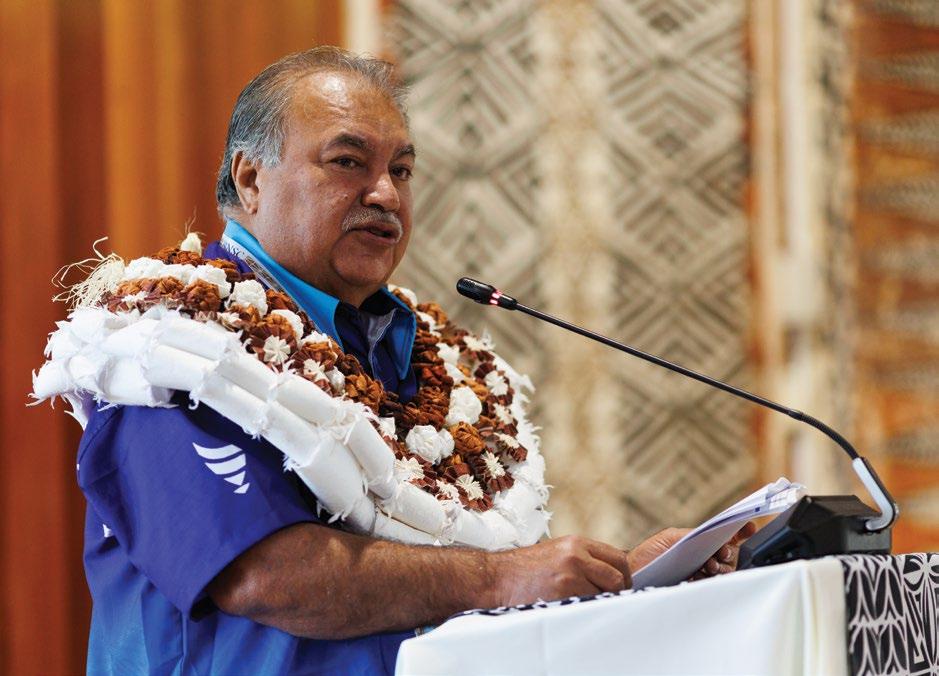
We work together, as communities, bound together like the woven mats that adorn the walls of this great room, to support each other.
At the regional level it is no different.
Each Pacific Islands Forum Members forms a strand of our great and powerful Pacific regional mat, around which we gather, much like you are doing here today, to share our experiences, share our challenges, and share solutions.
We share so that we can achieve our goal of leading free, healthy and productive lives.
We share because we know that we are stronger together, using our collective knowledge.
Many of you will know that I’m from Boe in the southwest corner of Nauru.
Though small, with less than one thousand residents and being under one square kilometre, it might now be the most recognisable village name in the Pacific.
And that is of course because I had the honour, as Forum Chair, of welcoming Forum Leaders to Boe in 2018 to discuss regional security matters and launch the Boe Declaration on Regional Security.
I mention this because I remain very proud of the message that the Forum shared that day, which was as true then as it is today: while the security of nation states is always a paramount concern for Governments, in the Pacific, the peace and wellbeing of Pacific peoples – the human element of security, must always be at the forefront of our minds.
And that is especially the case with regards to our Blue Pacific Continent, and the devastating impacts of climate change.
As I said in 2018, and as Forum Leaders have regularly reiterated, climate change is the single greatest threat to the peace and security of Pacific Islands peoples.
That must remain at the forefront of our minds this week, and it will remain at the forefront of my work on regional security throughout my tenure here at the Forum Secretariat.
In this regard, I am pleased to highlight that we are making great progress against our climate security goals, especially with the development of the Pacific Resilience Fund, which has received over 100 million US dollars of support so far.
Further, the Forum’s declarations on Preserving Maritime Zones in the Face of Climate Change-related Sea Level Rise and on the Continuity of Statehood and the Protection of Persons in the Face of Climate Changerelated Sea-Level Rise are world-leading and gathering support around the globe.
The Boe Declaration on Regional Security, and its subsequent Action Plan, continue to guide the way we prioritise our work to ensure the Blue Pacific Continent is peaceful and secure.
We continue to prioritise climate security, human security, environmental security, cybersecurity and countering transnational organised crime.
Indeed, it would be remiss of me to not take this opportunity to highlight the recent launch the Pacific Transnational Crime Disruption Strategy, and we will soon formalise the Pacific Partnership for Prosperity on Cybersecurity and Cybercrime.
These are two key areas of focus for Forum members at present, aimed at helping Forum Members, many of whom are experiencing a terrible surge in drug-related issues and devastating cyberattacks.
Further, Forum members remain committed to enhancing the role of women and girls in all their diversity across all these priority peace and security focus areas.
These are the areas where Forum Members countries are focusing our attention. And the areas which we continue to ask our partners to focus their support.
I am pleased that these are the areas that this conference will focus on.
Many people ask us about international conflicts and geopolitical competition, and the effects they have on peace and security in the Pacific.
It is true that the impacts of conflicts occurring a long way from our shores are being felt by Pacific peoples.
The impacts of the Russian invasion of Ukraine, the conflict in Gaza and tensions in the South China Sea continue to reverberate across the globe, and the Pacific is not immune.
On account of these developments Pacific peoples have been affected by supply chain disruptions which have added to inflationary pressures and made the cost of basic goods – food, medicine, fuel and so on- very difficult for many of our people.
In short, war, instability and a breakdown of peace anywhere in the world makes life more difficult for everyday citizens of the Blue Pacific Continent.
In this respect, I wish to reiterate what Forum Leaders said when I welcomed them to Boe six years ago.
Across the Blue Pacific Continent, we place great importance on the rules based international order founded on the UN Charter, adherence to relevant international law and the resolution of international disputes by peaceful means.
In terms of geopolitical competition my message is very simple and very clear.
Geopolitical maneuvering means nothing to Pacific peoples who have cyclones coming over the horizon.
Geopolitical maneuvering means nothing to Pacific peoples who have water lapping at their doorsteps due to sea level rise.
Geopolitical maneuvering means nothing to Pacific peoples who are focused on building resilience, peace and prosperity for our families, communities, nations and our region.
When you arrived here today, right at the entrance of the Secretariat, you came past the Nasonini Gun Battery, which was built in 1942 after the devastating effects of armed conflict found its way to our peaceful region.
When built, the Nasonini Gun Battery included three six-inch guns and a radar detection system.
Those guns, now thankfully long-since inoperational, serve as a reminder of the mess we can find ourselves in when foreign powers use our region as a theatre for their grievances.
The Pacific Islands Forum is blessed with the support of 21 Forum Dialogue partners from all corners of the globe.
In becoming Forum Dialogue Partners, these countries committed to supporting all Forum Member countries to achieve peace and security in the Blue Pacific Continent, supporting Forum Leaders’ priorities like those outlined in the Boe Declaration on Regional Security.
Those partners have all committed to continuous transparency in declaring economic, political, and strategic interests in engaging in the region, and that is a commitment we should all be regularly reminded of.
I look forward to working with all our Forum Dialogue Partners to help ensure all Pacific peoples can lead free, healthy and productive lives.
In closing, let me leave you with a quote from Matthew chapter five, verse nine, which provides a great reminder for us all here this week.
It notes… ‘Blessed are the peacemakers, for they will be called children of God’.
By being here this week, you are showing your commitment to peace and security in our Blue Pacific Continent.
You are showing your commitment to being the peacemakers.
Thank you for that commitment.
May it live on for many years to come.
Tubwa kor, vinaka and thank you.





Ni sa bula
1. We, representatives of the Pacific security community, gathered in a spirit of friendship and cooperation to talanoa at the Pacific Regional and National Security Conference in Suva, Fiji, from 24 to 26 June.
2. Our Conference brought together representatives and experts from all members of the Pacific Islands Forum and ten partner organisations – the Forum Fisheries Agency, Oceania Customs Organisation, Pacific Fusion Centre, Pacific Immigration Development Community, Pacific Islands Chiefs of Police, Pacific Islands Forum Secretariat, Pacific Islands Law Officers’ Network, Pacific Security College, Secretariat of the Pacific Regional Environment Programme and The University of the South Pacific – highlighting the strength and solidarity of the Pacific security effort.
3. Our Conference reflected our belief that we can all contribute to peaceful, safe and prosperous Pacific communities by cooperating and learning from each other. And this unity, cohesiveness and interdependence will be more necessary than ever if the Blue Pacific is to tackle the urgent challenges before it.
4. We heard from the Prime Minister of Fiji The Honourable Sitiveni Rabuka who told us the Blue Pacific faces a polycrisis in coming decades encompassing climate change, transnational crime, threats to human security and geopolitical tensions. Fortunately, the Pacific brings enormous strengths to meeting these challenges.
5. To this end, Secretary General Baron Waqa highlighted the holistic approach to security in the Boe Declaration on Regional Security 2050 Strategy for the Blue Pacific Continent as the right approach for the Pacific, an approach which also has much to offer to the rest of the world. As Secretary General Waqa has said, we are a region that promotes stability and security with a culture of love and respect.
6. We reflected on the whole of region, whole of government and whole of community response needed for realising this holistic approach and confronting our existential challenges, bringing together security and social policy agencies, civil society, churches and families. From our discussions about the decades ahead, unified action is needed from all of us to create the future we want in 2050.
7. We reflected on the fundamental importance of information sharing between national and regional agencies for solidarity, and as the basis for effective coordination and action.
8. We also reflected on the new and updated legislation and policies, technological capabilities, investment in training and infrastructure, and international, public and private partnerships needed to promote national security and resilience and uphold the rule of law in an increasingly interconnected and volatile world.
9. We also emphasised the importance of drawing on our traditional knowledge, languages and cultural and spiritual values to navigate a dynamic present and future, and marrying national sovereignty and understandings with regional cooperation and commitments. We also emphasised the importance of drawing on the voices of youth and civil society.

10. We highlighted the benefits of national security strategies, as called for in the Boe Declaration on Regional Security. National security strategies that reflect consultations across government and the community, and reflect the values and priorities of the individual Forum member, will be a strong and lasting legacy for that country and the region.
11. We congratulated
• Nauru, The Republic of the Marshall Islands, Tonga and Niue, which announced they had begun the journey of creating their national security strategies
• Vanuatu, for the recent completion of its biennial review of its national security strategy
• Solomon Islands, which announced a review of its national security strategy
• Fiji, which is undergoing its National Security and Defence Review process, and also developing Fiji’s first Foreign Policy White Paper, which will define Fiji’s values and interests
• Papua New Guinea, for leading national security policy development in 2013, for revising and updating its National Security Policy for 20242029, and for establishing a National Security Agency to coordinate national security
• Cook Islands, on the completion of the world-leading performance assessment framework for its national security strategy
• New Zealand, on the launch of its national security strategy
• Australia, on the release of its inaugural National Defence Strategy and commitment to release biennial defence strategy updates.
12. We highlighted climate change remains the single greatest threat to the livelihoods, security and wellbeing of Pacific peoples and we continue to exist under a “State of Climate Emergency.” The acceptance of Loss and Damage under the UNFCCC signals that climate change impacts go beyond mitigation and adaptation. They are part of the “triple planetary crises” of climate change, waste management and biodiversity loss. We also highlighted the Pacific Regional Framework on Climate Mobility for managing the critical issue of climate induced mobility, which will only grow in importance in coming decades.
13. We suggest to Forum members the next iteration of the Boe Declaration Action Plan could consider existing and emerging security priorities such as
• maritime security
• artificial intelligence
• illicit drugs
• non-communicable diseases
• HIV/AIDS
• waste and pollution
• biodiversity
• food security
• youth unemployment
• short and long-term migration
• cultural security
• geopolitics
• nuclear and other legacy issues (including explosive ordnance risk
• reduction) and
• gender equality as additional or expanded priorities, complementing the existing Boe Declaration priorities of climate security, human security (including humanitarian assistance), environmental and resource security, transnational crime and cyber security.
14. We highlighted the continuing relevance of the Biketawa Declaration, and the value of collective responses to security and humanitarian crises across the Blue Pacific Continent.
15. We acknowledged the contribution of our regional security organisations to national and regional security. We welcomed the Pacific Islands Forum Secretariat and Pacific Fusion Centre’s Pacific Security Outlook Report for promoting understanding of the volatile security environment, and also welcomed the Centre’s most recent assessment on women’s political representation.
16. As Forum members consider reviewing and strengthening the regional architecture, we highlighted the benefit of even greater cohesion among existing agencies and actors.
17. We noted the value of regional talanoa like the Pacific Regional and National Security Conference in bringing the Pacific security community together for free and frank exchanges; for sharing different perspectives; for promoting a cohesive effort to meet the polycrisis before the Blue Pacific; and for supporting long-term thinking about creating our preferred future for 2050. We proposed the Conference become an annual event, adjacent to a meeting of the Forum Officials Committee Subcommittee on Regional Security (FSRS). Should Forum Leaders decide to create a Forum Security Ministers Meeting, it may be worth considering holding the Conference adjacent to the FSRS and that meeting. We also highlighted the value of national dialogues, to discuss local and national issues and to feed into regional dialogues.
18. We thank Secretary General Waqa and the Forum Secretariat team for making the Forum Secretariat’s facilities available for the Conference. We also thank the Government and people of Fiji for their warm hospitality.
Vinaka vaka levu

“We are a Pacific village, what affects one affects us all.”
The National security panel brought together a number of the Pacific’s leading national security practitioners. They highlighted the complex security issues facing Forum members, and that these issues needed whole of government responses, more resources, and rigorous prioritisation.
The panel focused on the experiences of several countries in developing the national security strategies called for in the Boe Declaration on Regional Security.
Cook Islands launched its national security strategy in 2023 following widespread consultation, and workshops assisted by the Pacific Security College. A performance assessment framework ensured accountability, including through annual reports to Parliament. The strategy was designed to be a living document, subject to regular review.
Fiji had been developing a national security strategy over an extended period. A draft strategy came very close to completion several years ago, but was put on hold. Managing the perspectives of elected representatives and officials was important. The current government had now restarted the process, with a new team in place, guided by an independent review.
Vanuatu launched its national security strategy in 2019. Extensive consultations were held within and outside government to develop the policy. The passage of national security legislation in late 2019 established the National Security Council headed by the Prime Minister. The process had been relatively smooth.
The Vanuatu strategy was reviewed and updated this year, taking account of changes in the security environment, as well as the resourcing and capacity challenges of line agencies. The review process also enhanced accountability and communication with all stakeholders, and provided greater clarity on their roles.
In the Republic of Marshall Islands (RMI), national security legislation had been passed this year, drawing on the experience of several Forum members, including Palau, Cook Islands and Vanuatu. The next step in developing the strategy had been the appointment of a Director of National Security.
Panellists identified the major national security challenges in their countries as climate change and natural disasters; cyber security; and transnational crime, especially narcotics. Other challenges included noncommunicable diseases, Artificial Intelligence, the capacity of government systems, and - in the case of RMI - nuclear legacy issues.
The importance of clear and frequent communication amongst stakeholders in identifying and managing security threats was highlighted. In Vanuatu a National Security Officials Committee met monthly, and regular contact maintained with designated focal points in line ministries.
Regional and sub-regional communication remained important, and greater regional interaction on practical issues would pay dividends. Connecting with the local government level was also vital, as communities have a key role in managing security issues on the ground. ‘Kava diplomacy’ and other traditional Pacific approaches to community building could play an important role.
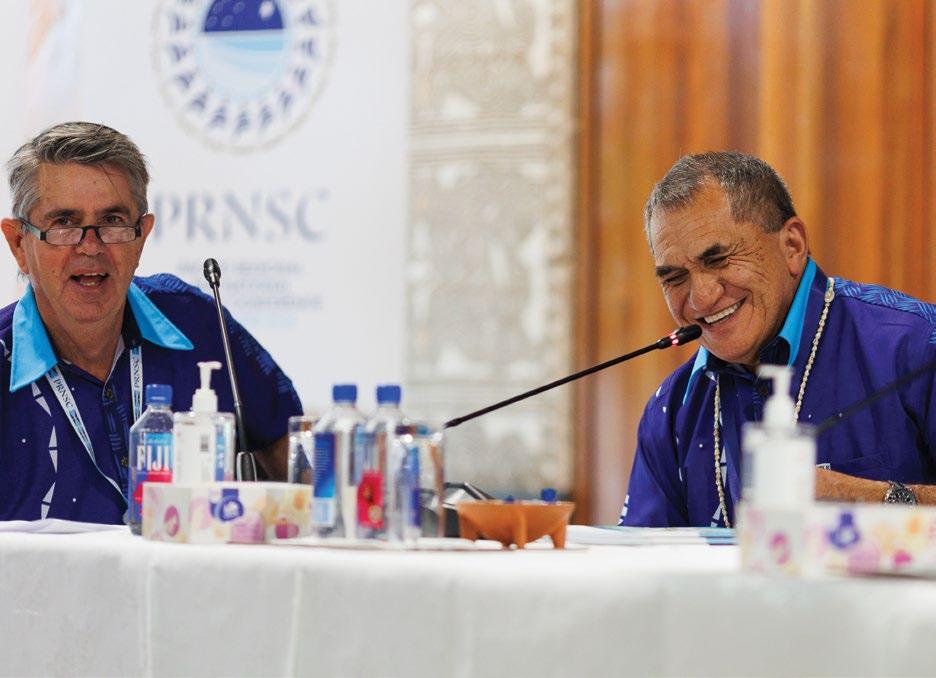


“Peace building is a bus, an intergenerational bus. We’re all on the bus ride together. It’s just that we’re getting on at different stops..”
Panellists reinforced the vital role Pacific women play in the prevention and resolution of conflict. Women had key roles in past peace processes, including Bougainville, and their presence was growing in Pacific police and defence forces. While prejudices remained, women were quietly and effectively showing their value and breaking down barriers.
Participants heard the Boe Declaration provided a solid basis for further advancing women’s roles in national security. There was considerable potential for women to do more in the security space. To realise this, national security strategies needed to recognise the role of women, and more women needed be included in planning, decision-making and implementation.

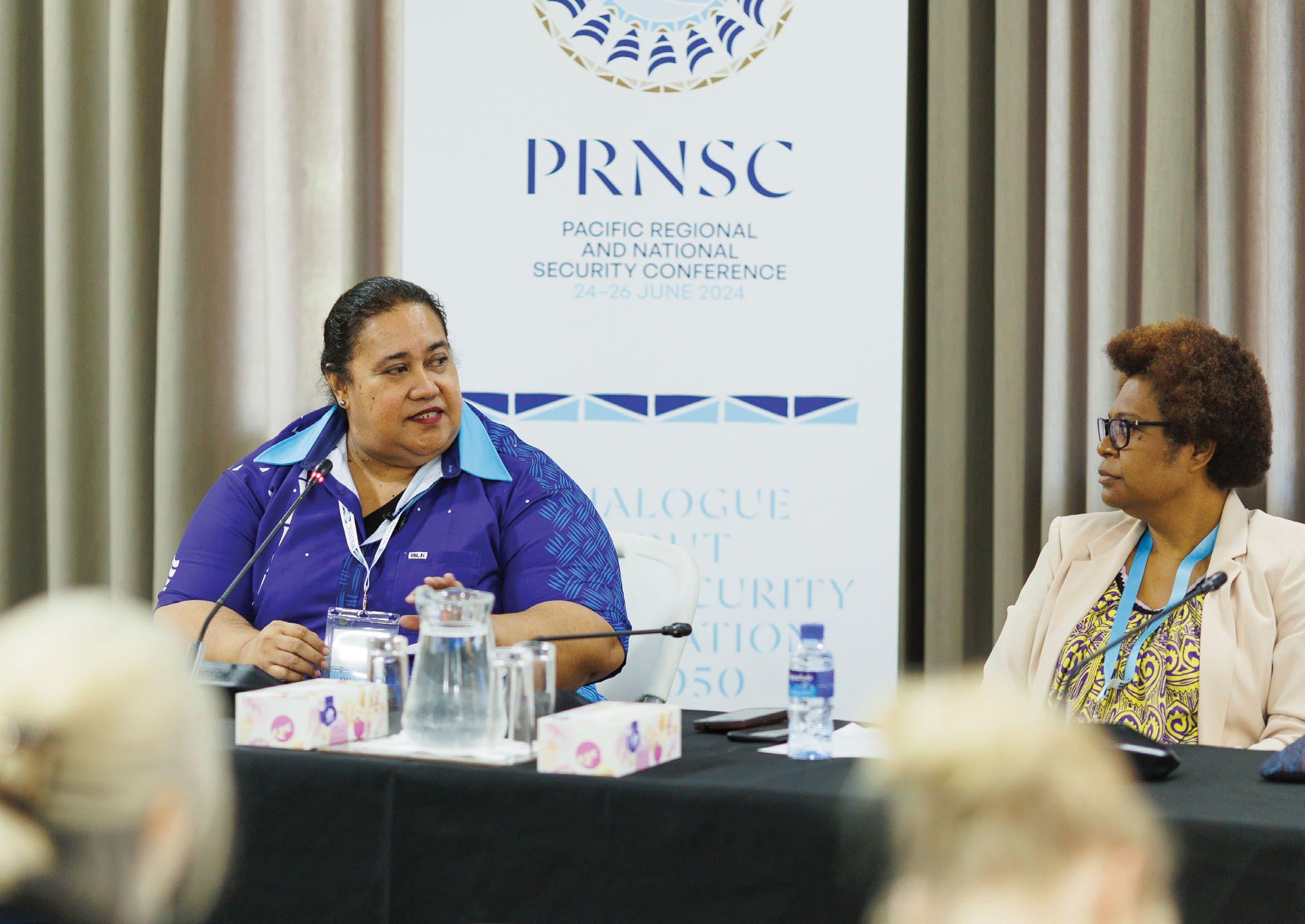
The voices of women needed to be heard as Pacific security systems were developed and reviewed. Many recent trends, such as large-scale labour mobility dominated by men, added to a complex picture for Pacific women. Women needed to be better represented at all levels in national security organisations across the region.
While there had been some progress, more needed to be done to remove structural barriers - and biases - that impact women’s participation and potential. Male champions of change had an important role to play in this regard. They could provide leadership and the resources to bring about change. Resetting the narrative and using more gender-appropriate terminology would help to advance these goals.
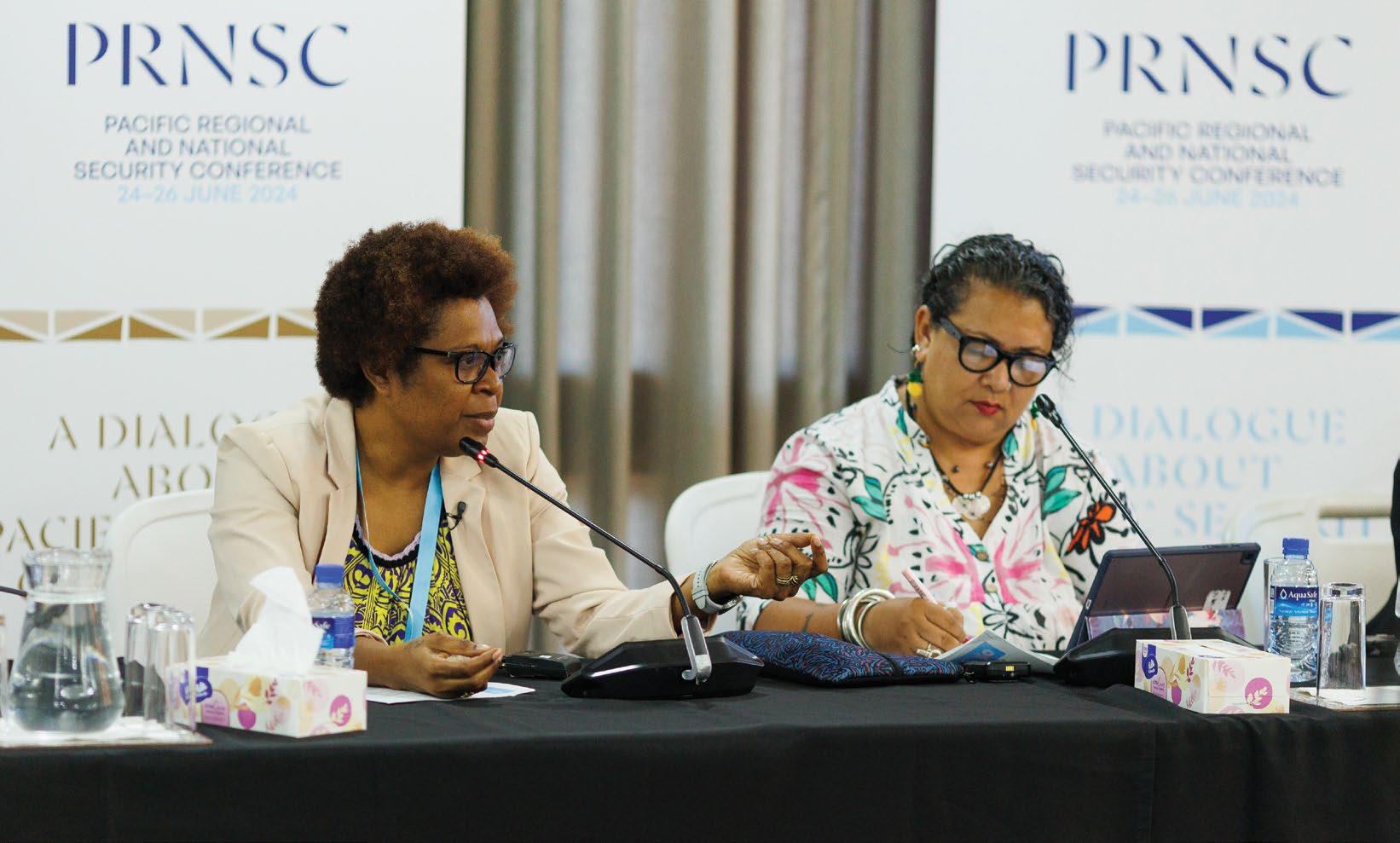


Panellists acknowledged the activities of cybercriminals and state-sponsored cyber actors have increased significantly across the Pacific. The threat to individuals, businesses and governments was only likely to grow in coming years.
The instantaneous nature of hostile digital activity added to the challenge for the Pacific. This was exacerbated by encryption and the difficulty of capturing and processing forensic evidence. The region needed be ‘quicker and smarter’ in dealing with cybercrime.
The Conference heard legislative reform was needed, especially to address specific crime types that aren’t yet defined in Pacific law. “It won’t be a crime unless it is legislated against.” Education initiatives for police, prosecutors, and judges – through the Pacific Islands Law Officers’ Network (PILON) and the Global Forum on Cyber Expertise (GFC) – offer opportunities to improve awareness, respond to misinformation and disinformation, and develop best practice technical solutions.
To mitigate against the risks of cybercrime, Pacific counties need to move quickly to articulate their cyber capability and capacity gaps. Stronger coordination of international support to address Pacific needs was in the interest of everyone.



Panellists discussed the immense economic and social value of the Pacific region’s vast maritime territory and resources. This included both the traditional fish stocks and new areas of activity such as deep seabed mining. A healthy and well-policed maritime environment was vital for the region’s prosperity and its citizens’ human security. Pacific countries needed to be clear and united in their messaging to donors and the wider international community.
Protecting the maritime environment will grow more difficult in coming decades for strategic and economic reasons, including tourism. This will require Forum members to coordinate closely with external partners, including to build the capacity of regional agencies.
The Conference heard the impact of climate change on the Pacific’s maritime resources must be a priority issue for security planners and environmental negotiators. Tuna resources, and fish migration patterns in general, were highly vulnerable, a significant global issue but existential for the Pacific.

Panellists reaffirmed that climate change was the greatest existential security issue for the Pacific, impacting on all aspects of governance and planning.
The Panel focused on the likely failure of humanity to keep the rise in global warming to below 1.5 degrees Celsius. As unpalatable as this was to accept, the Pacific needed now to better strategise around this reality in international negotiations, including on global financing. More needed to be done to prepare Pacific communities for life beyond 1.5 benchmark and in the face of the triple planetary crises of climate change, waste management and biodiversity loss. The Pacific Regional Framework on Climate Change Mobility was an important step in managing the critical and growing issue of climate induced mobility.
The Panel reinforced the establishment of a Loss and Damage Fund had been an important development for vulnerable Pacific countries. But international finance commitments and flows remained well below estimated needs and hard to access for Pacific nations. Global funding instruments also needed to take better account of the different circumstances Pacific countries face. And regional governments needed to be better at telling these bodies what was needed. Simplified, more direct access for governments and communities to these funds would speed up implementation.


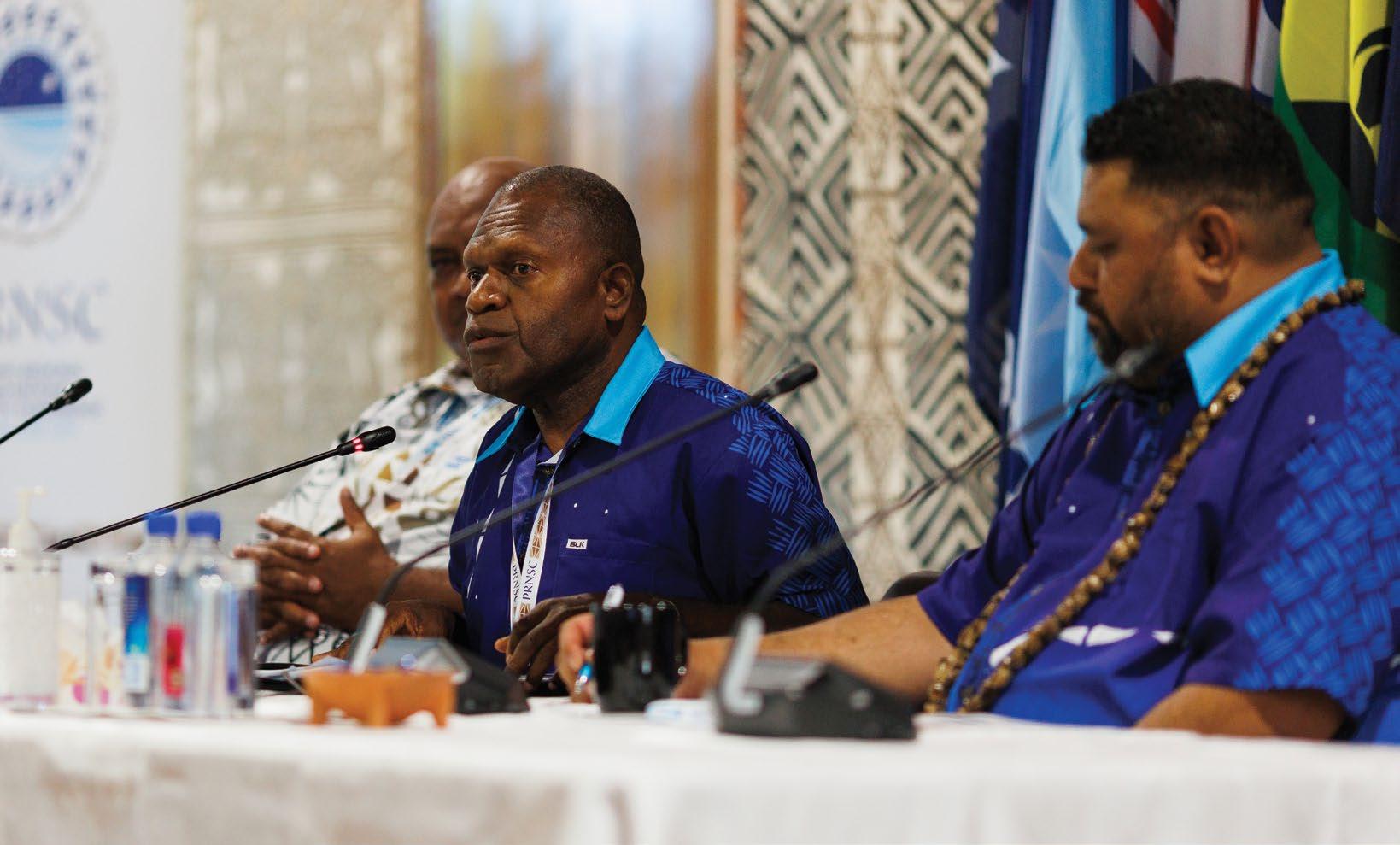
There remained some questions about the absorption capacity of regional agencies and communities, and they needed to be better resourced to manage this.
The Panel concluded the Pacific had to mobilise and coordinate resources as a region. Pacific countries needed to improve communication and skill transfer amongst themselves, and build capacity in all countries. Arguably the data to allow a better understanding of a plus 1.5 Pacific already existed but required more comprehensive work to be made useful.
There was wide recognition among participants of the potential benefits of drawing on traditional approaches in countering the impacts of climate change. The old ways of land management, for example, had the potential to boost and maintain biodiversity.
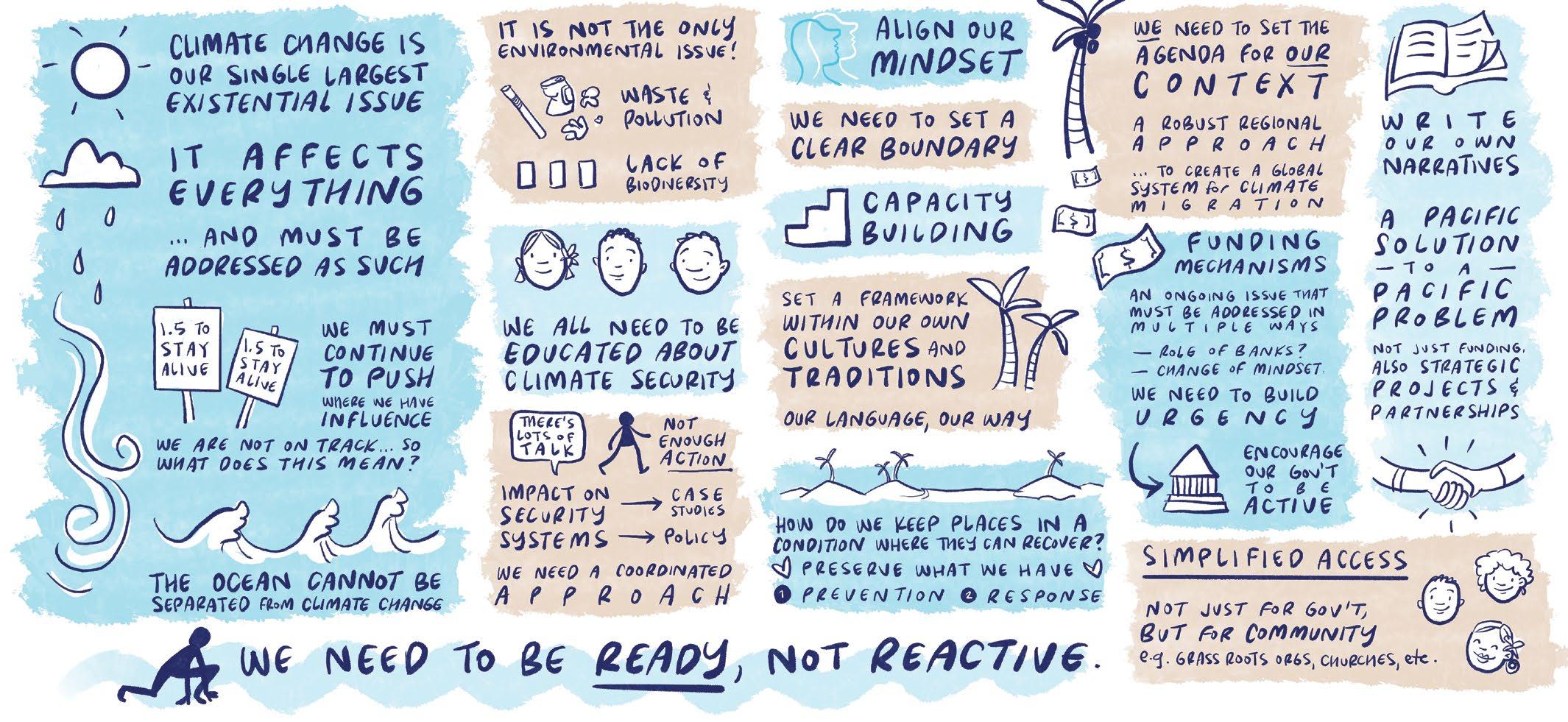

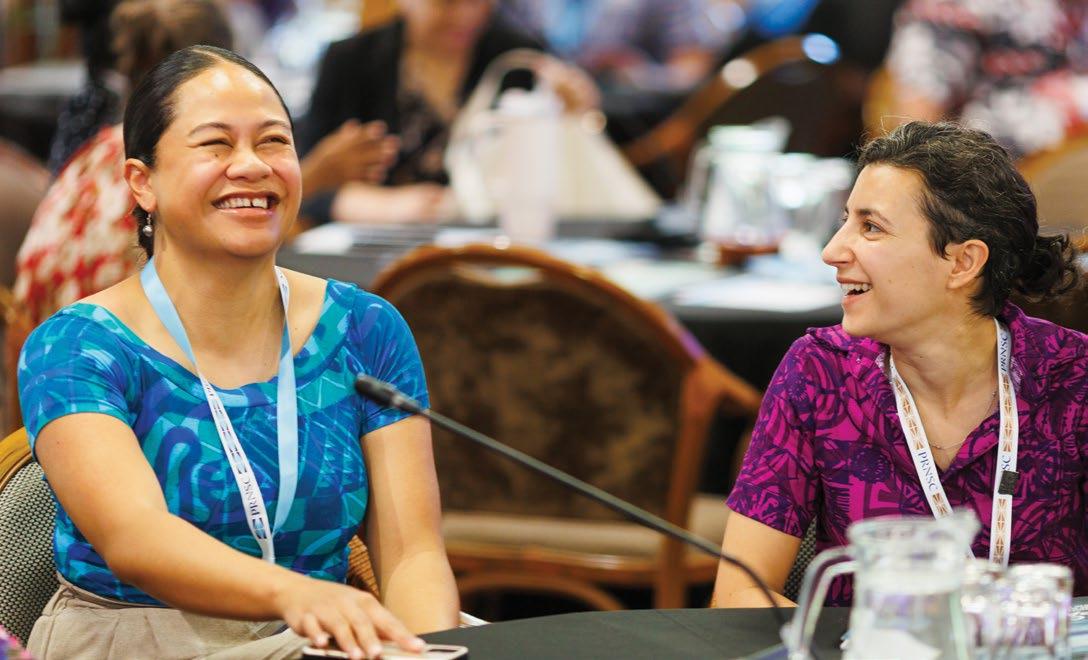




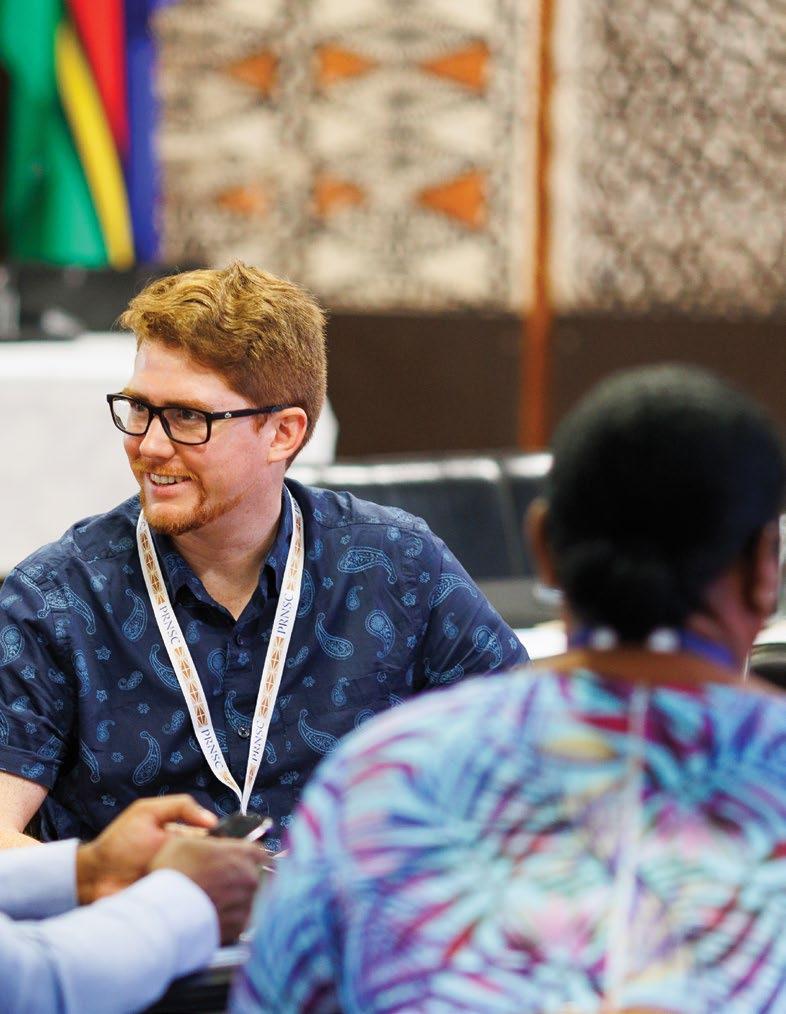
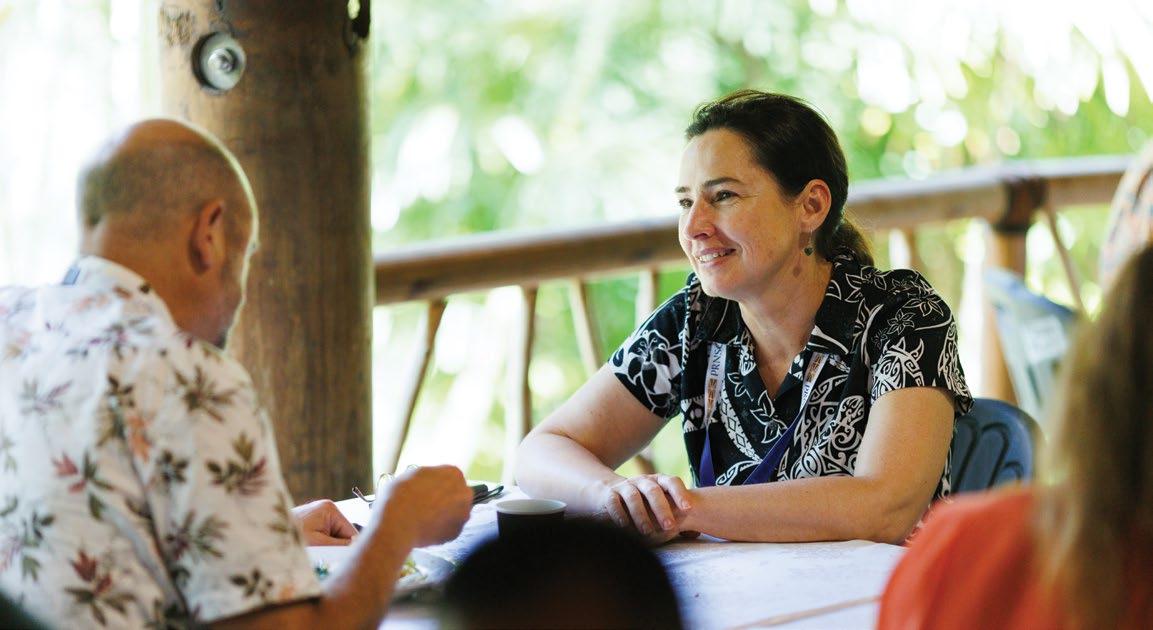
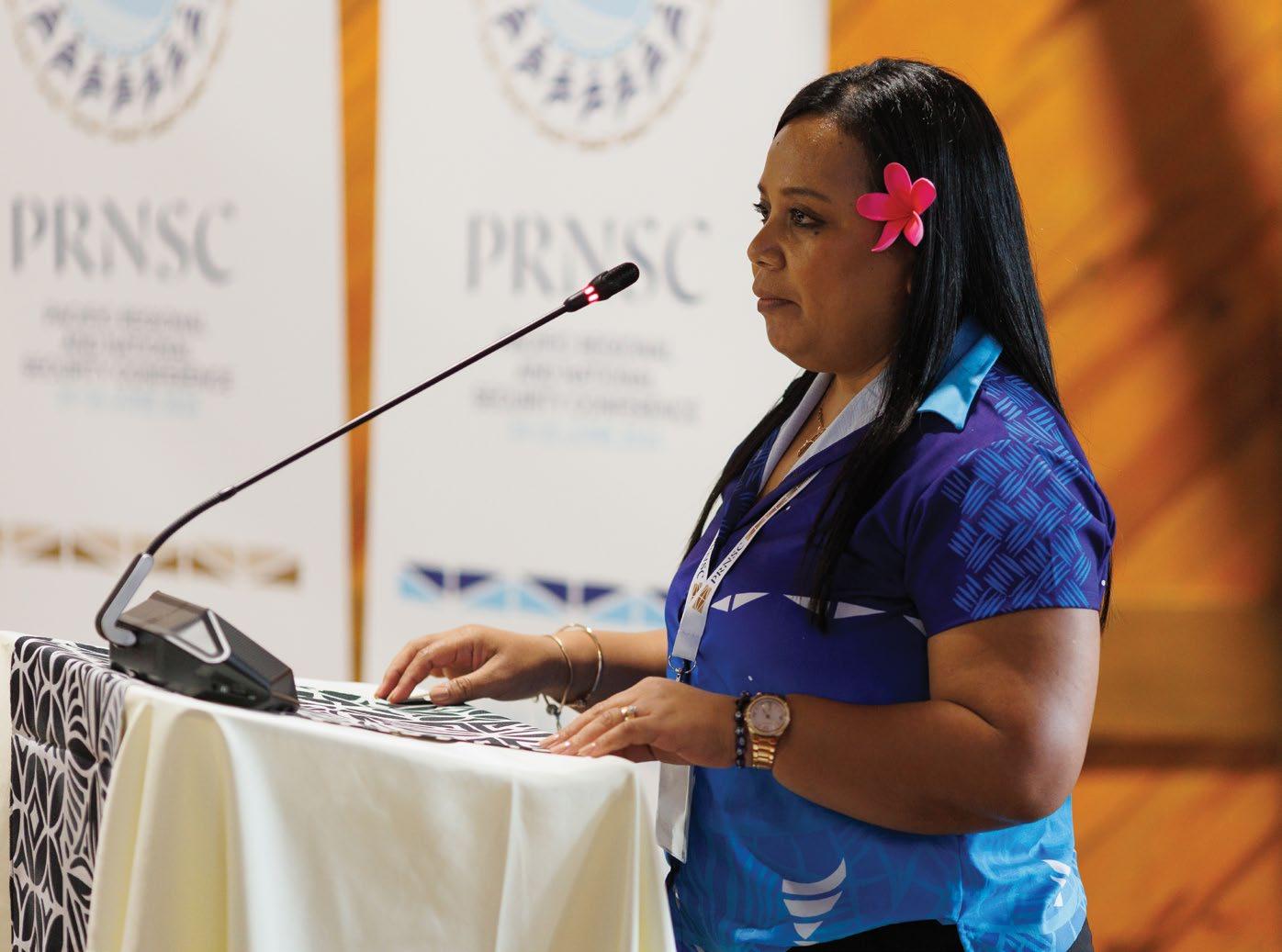

“Organised crime moves at the speed of electrons. Policing moves at the speed of legislation.”
Panellists outlined how Pacific police are being integrated into whole-ofgovernment security planning, including the formulation and delivery of national security strategies. Pacific police leadership needed to manage the expectations of government, community and other stakeholders. And they had to be better at articulating and advocating for personnel and other resources.
The Panel outlined many of the many challenges of modern policing. Transnational organised crime posed multiple threats. The criminals were able to quickly exploit new technologies. Police responses were constrained by limitations on technical support, such as testing labs for drugs, and training programs, and legislative frameworks that were struggling to keep up with the new areas of criminal activity.
Legislation needed to be harmonized across the Pacific to counter jurisdiction shopping by organized crime. Transnational criminal activity required transnational policing responses including enhanced cooperation and information sharing between forces and donors.


Pacific policing numbers were well below international standards and were failing to keep up with rapidly increasing populations and agendas. Papua New Guinea for example had less than 65 police officers per 100,000 people. Budget pressures and threats to national income, including from climate change, could exacerbate this further and increased the need for skilled police diplomacy and advocacy. The international community could better fill gaps, including with advisory support and access to technical services the Pacific couldn’t afford.
Pacific police were also facing rising expectations from communities for leadership on a wider range of challenges. COVID-19 had been a challenge for the status and legitimacy of police as the face of rules enforcement. Climate change would likely pose enormous challenges for enforcing rules in a crisis environment.


Panellists presented legal and private sector perspectives on what AI can bring to the region.
There was consensus that there were potentially significant benefits now and in the future for the Pacific. Governments could enhance productivity and creativity in service provision; communities should see significantly improved access to banking, health, education and other core needs. This could include the Pacific’s most isolated areas if connectivity was made more reliable and accessible.
AI could enhance most, if not all, areas of national security. But it also posed a range of potential threats, a number of which have already impacted the region. Deep fakes and other aspects of AI could be used to promote fraud and identity theft, undermine privacy and cultural sovereignty, and support cyber crime.
The panel strongly recommended governments focus on the basics in approaching AI. Countries had the opportunity to learn and build on legal and other work already done by the OECD, the EU and countries including the United States. AI would have the most benefit if it was able to build on detailed and accurate data. Governments also needed to lead the way in responding firmly and quickly to AI when misused; and educating Pacific peoples, institutions, private sectors and politicians on the threats of AI.


Panellists reflected on the scope and importance of human security issues for the Pacific. Human security was a focus of the seminal 2017 Boe Declaration and would likely feature prominently in the current review of the Declaration.
The Conference heard human security encompassed food and water, health including the threats of communicable and non-communicable diseases, education services, biosecurity threats, nuclear legacy issues, and more. It was central to livelihoods, well-being and wellness and faced a multitude of threats. Notably this included climate change which impacts on a broad swathe of human security issues, such as water quality, agriculture and fisheries, and access to health and other services. The Panel agreed this needed to be more widely understood, especially at the community level.
Labour mobility was also having a major impact on human security, affecting families and livelihoods, and causing workforce shortages in formal employment sectors as well as at the village level.
Culture was an important cross-cutting enabler of human security, for example in relation to food and agriculture, education, tourism and climate change. This had received insufficient recognition, although this is changing, as evidenced by the Pacific Regional Cultural Strategy 2022-2032 and recent CROP agency deliberations. The Conference heard there was a good case for cultural security to be included as an element of human security in the next Pacific Regional Security Outlook Report for 2024-25.


Panellists said the history of the Pacific should inform the strategies that needed to be adopted to combat human security threats. Human security was intimately linked to traditional and other rights of access to land and sea. Strong legislation was needed to protect those rights in the modern world as were security actors like the police. But decision makers needed to be cautious about international approaches based on income levels and definitions of poverty that don’t necessarily reflect the real situation in the Pacific.
The non-communicable disease crisis in the Pacific affects health and livelihoods, places an increased strain on public health systems, depletes the workforce including in rural areas, and acts as a drag on national economies. The ‘One Health’ approach provided a good example of a collaborative, whole of government approach to a human security issue. Combining the environment, public health and agriculture sectors, and productive external engagement, it had helped break down silos in tackling health and biosecurity issues affecting humans, animals and pests.




Panellists emphasised customs and border management personnel were at the frontline of Pacific Islands national security and invariably had the first interaction with criminality. Coordinated border management and strategic planning were thus vital for national security. But in many places in the Pacific this remained an aspirational goal with wide variations in capacity.
The growth in tourism was making criminality harder to detect at the border, as was the region’s growing dependence on food and other imports. Frontline personnel were vulnerable to intimidation and corruption as the value of the illicit trade increased.
Smuggling had become more sophisticated. Expanded information sharing offered a key opportunity to strengthen border management, including in the forewarning of new and novel methods of operation. But low salaries and lack of funding for detection are impacting on capacity in border management. More needs to be done to break down operating silos and encourage coordination between agencies domestically and regionally.

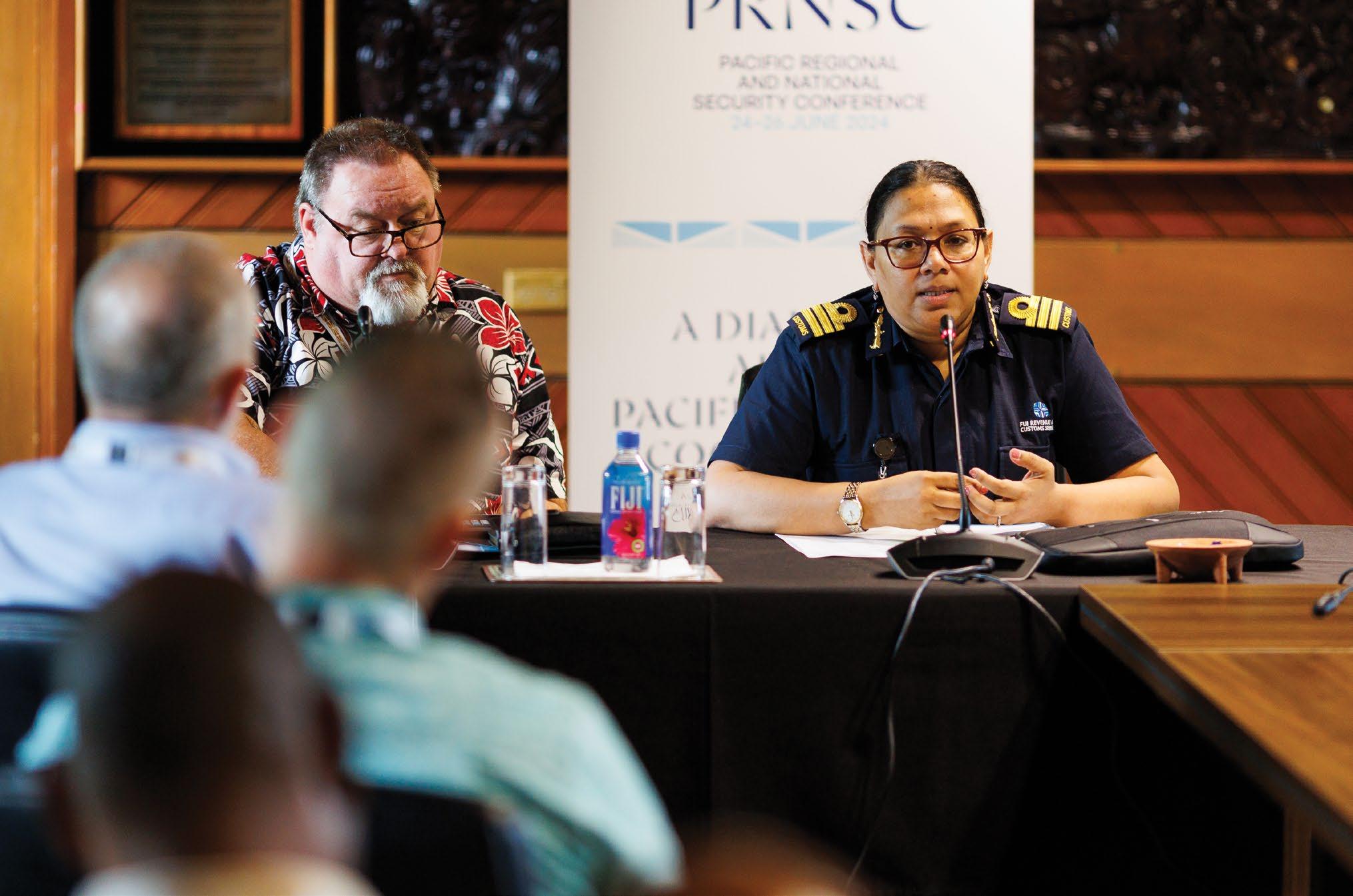
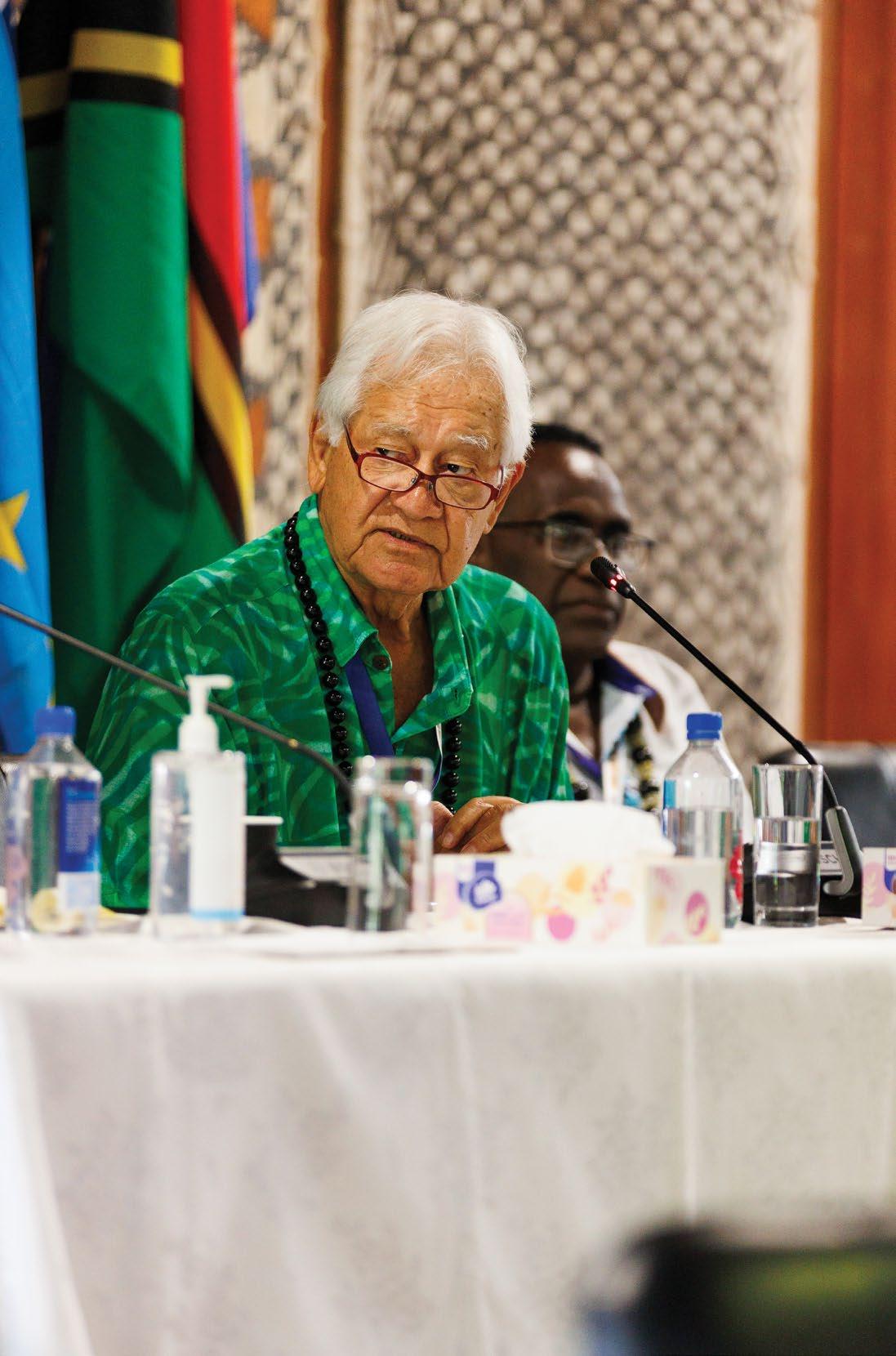
Panellists noted the increasingly complex security environment globally and the heightened geopolitical competition in the region. The discussion focused on how the Pacific could navigate these cross-currents.
The Pacific, like other regions in the world, was affected by the rise in geopolitical competition between the major powers - ‘great power politics will always shape us’. External interest in the Pacific related to its geography and resources; its ports, maritime zones and sea beds; its critical infrastructure, and more. So the region had assets which would enhance its leverage, and had 14 votes in the United Nations. Pacific countries were diplomatic price-setters.
For decades the region only interacted with its traditional partners. This was changing with the rise of China, which sought to reshape the rulesbased global order. The Chinese presence in the region had grown rapidly, and China was targeting elites in a number of government and other sectors.
The region had suffered from geopolitical competition in the past, including as a major theatre in WWII, and from nuclear testing.
The United States and China were here for their own reasons. Part of the region was already highly militarised. If tensions escalate dto the point of fighting, it would have significant implications for the peoples of the Pacific.

The Conference heard the UN Secretary General was deeply concerned by the rise in global tensions and was calling for a new agenda for peace. The Pacific region had a responsibility to contribute to these serious geopolitical threats. The region had the basis for collective action for a secure region, including in the Treaty of Rarotonga, the creation of the Pacific Island Forum and its declarations like Biketawa and Boe, and in RAMSI and the establishment of the Forum Fisheries Agency. These had been the region at its best.
Forum members had their distinct interests with the United States and with China. China and the BRIC countries were now important players globally, while Western influence had been declining. Many Pacific States had strong economic and cultural ties with China, from whom they received various forms of assistance. It was argued China should not be characterised as an enemy, and we should not be swayed by media agendas.
The Conference again heard that climate change was the single greatest threat to the security and well-being of Pacific people. But geopolitically, the region may have a unique opportunity to build on the influence the Pacific had earnt internationally on climate change. This might be done through an enhanced Boe Declaration or the development of Prime Minister Rambuka’s concept of an ‘Ocean of Peace’. It was time for a deep discussion led by the region of the common threats faced by the region, and how to proactively design a pact to overcome these.
There was a strong view the region would be more secure through closer integration and the reduction of barriers between Pacific peoples. Panellists suggested a common passport, greater mobility within the region, and joint maritime cooperation could be explored. The region needed to do better with governance to build confidence in institutions both nationally and regionally.


“Our communities are our first responders to any disaster.”
The Humanitarian and Disaster Relief Panel brought together a number of the Pacific’s leading disaster relief coordinators, representing both the government and non-government sectors. The discussion focussed on disaster preparedness and highlighted the vital and central role communities play in responses. Traditional knowledge, people-to-people relationships, and modern systems and technologies all had key roles in early responses to disasters and long-term recovery.
Panellists agreed more should be done to support Pacific communities in preparedness, response and recovery. Communications, emergency shelter and information sharing were identified as priorities. Communities needed to be empowered and resourced. Established, well accepted technologies, such as AM radio and cash vouchers, often provided the most effective, cheapest and simplest tools in disaster responses, but their roles needed to be clearly outlined and practiced.
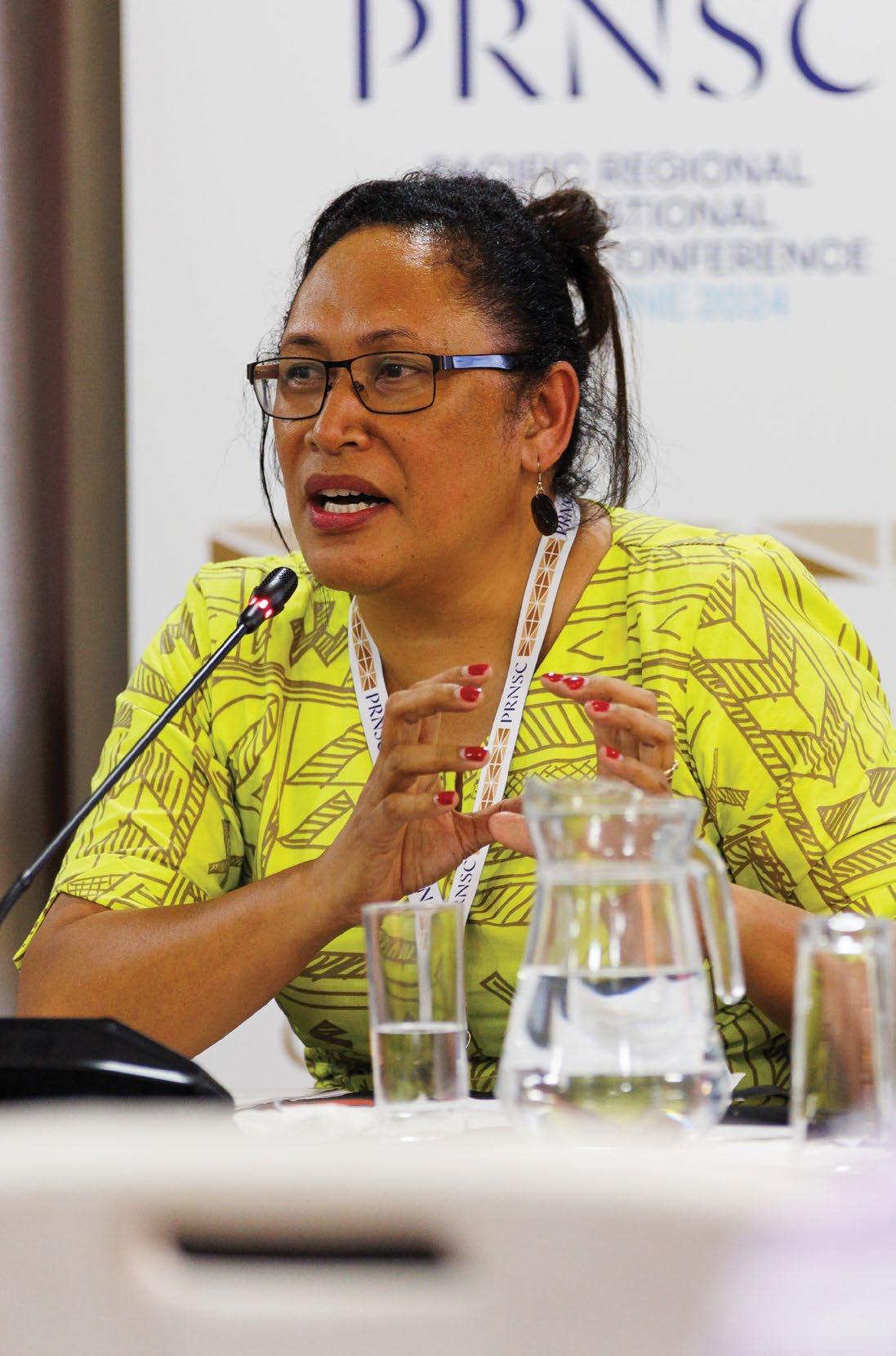

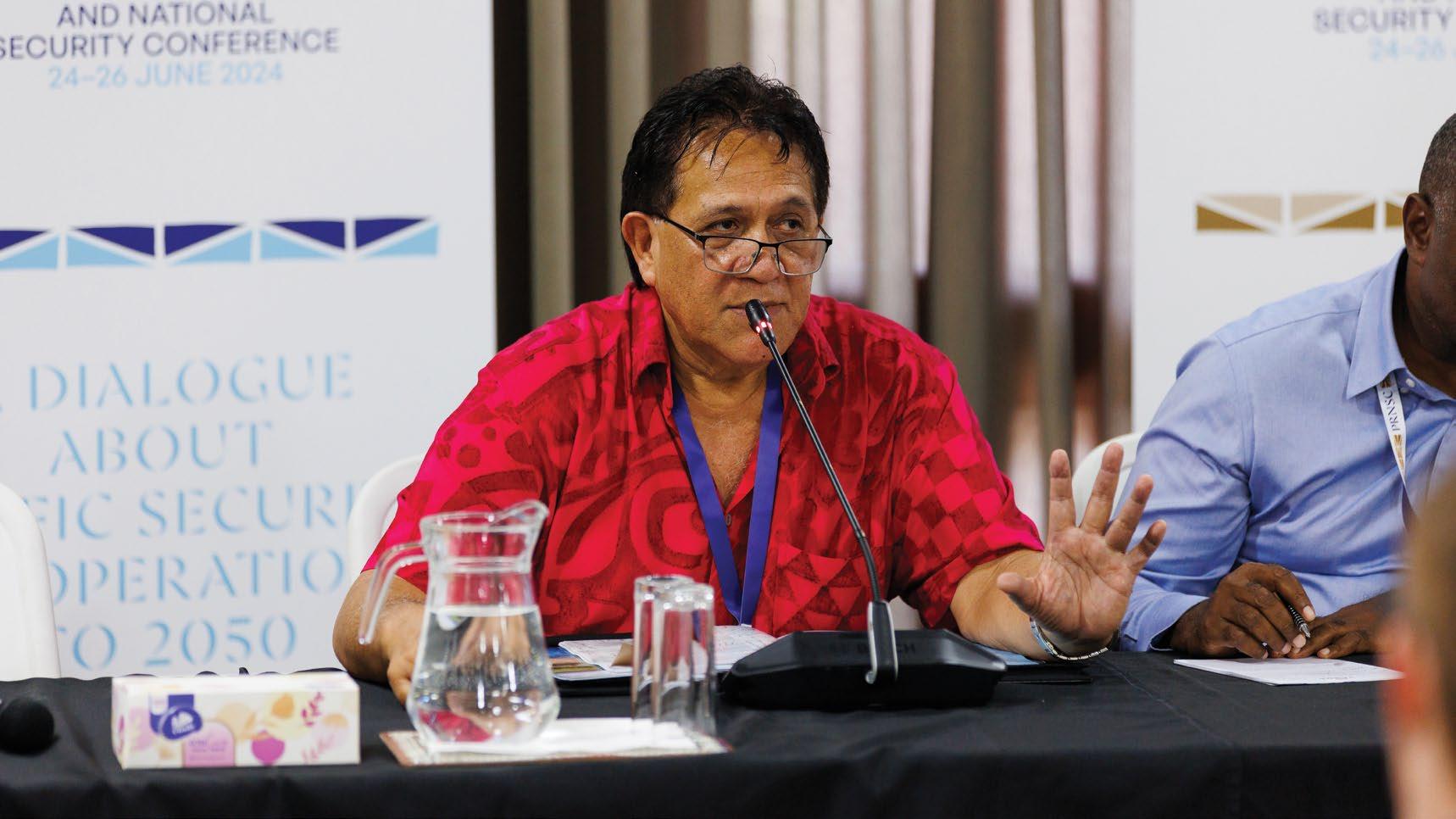
Pacific governments had a key coordination role. This included mobilising resources, coordinating with NGOs and partner governments, and ensuring regional organisations that had vital functions in disaster preparedness, such as the Fiji Meteorological Office, understood the needs of potentially impacted countries.
Regular reviews of the systems and structures that supported humanitarian responses and training personnel were essential.
Communities of practice in countries and communities across the region could add considerable value.
Contingency planning for humanitarian disasters needed to take into account the large number of tourists and other short-term visitors that were likely to be caught in the event.



Panellists built on the earlier discussions on law enforcement to outline a complex and multifaceted environment. Drivers of transnational crime in the Pacific included rapid technological adoption by criminals, sustained illicit drug demand (particularly from the Australia and New Zealand markets), use of ‘hybrid’ identities across licit and illicit markets, as well as enablers such as ‘golden passports.’
The Conference heard the size and spread of Pacific diasporas, and regional criminal deportation arrangements, posed additional unique challenges for law enforcement. Poverty and lack of employment opportunities were encouraging criminal activity. Criminal deportees were being returned without skills, local language or community support. There was a broader role for civil society and nongovernmental organisations in complementing restorative justice with rehabilitation and settlement services. Traditional and religious leaders needed to be part of Pacific solutions.

Panellists provided a number of case studies, particularly of drug importation and transit, that showed the increasing scale of the problem. Foreign criminals were running hybrid operations using commercial businesses as cover. There was increasing evidence of Asian syndicates, Mexican cartels and other foreign criminal actors engaging in the region, and utilizing measures designed to enhance trade to support their activity. Ice, meth and other drugs were arriving in some regional states by air and maritime routes, with criminals becoming more sophisticated in their use of freight, tourists and citizens for trafficking.
It was vital that law enforcement retained the confidence of governments and the community. Fraud and internal corruption threatened this and needed to be confronted. Legislation requiring explanations of conspicuous wealth was on the books in at least one regional state. Tougher penalties for individuals engaging in drug importation were also being floated.
International cooperation was required to defeat transnational crime, including sharing information and intelligence. This should include cross jurisdictional cooperation for joint investigations and operations.
“How do we think regionally and act nationally?”
The Regional Security Panel built on earlier discussions to consider how the Pacific could respond and manage the opportunities and challenges before it.
Some panellists emphasised the focus of regional efforts needed to be on responding to the Pacific’s own current and future crises, such as forced migration arising from climate change. In this context, geopolitical tensions were a ‘distraction’ or background ‘noise’ that should not be allowed to divert the region from addressing its own pressing security priorities.
Other panellists suggested the region could not quarantine itself from the global strategic currents. Both the US and China traditionally sought to set the terms of their own engagement with other countries and regions. China appeared motivated by an ambition to reshape the existing regional order.
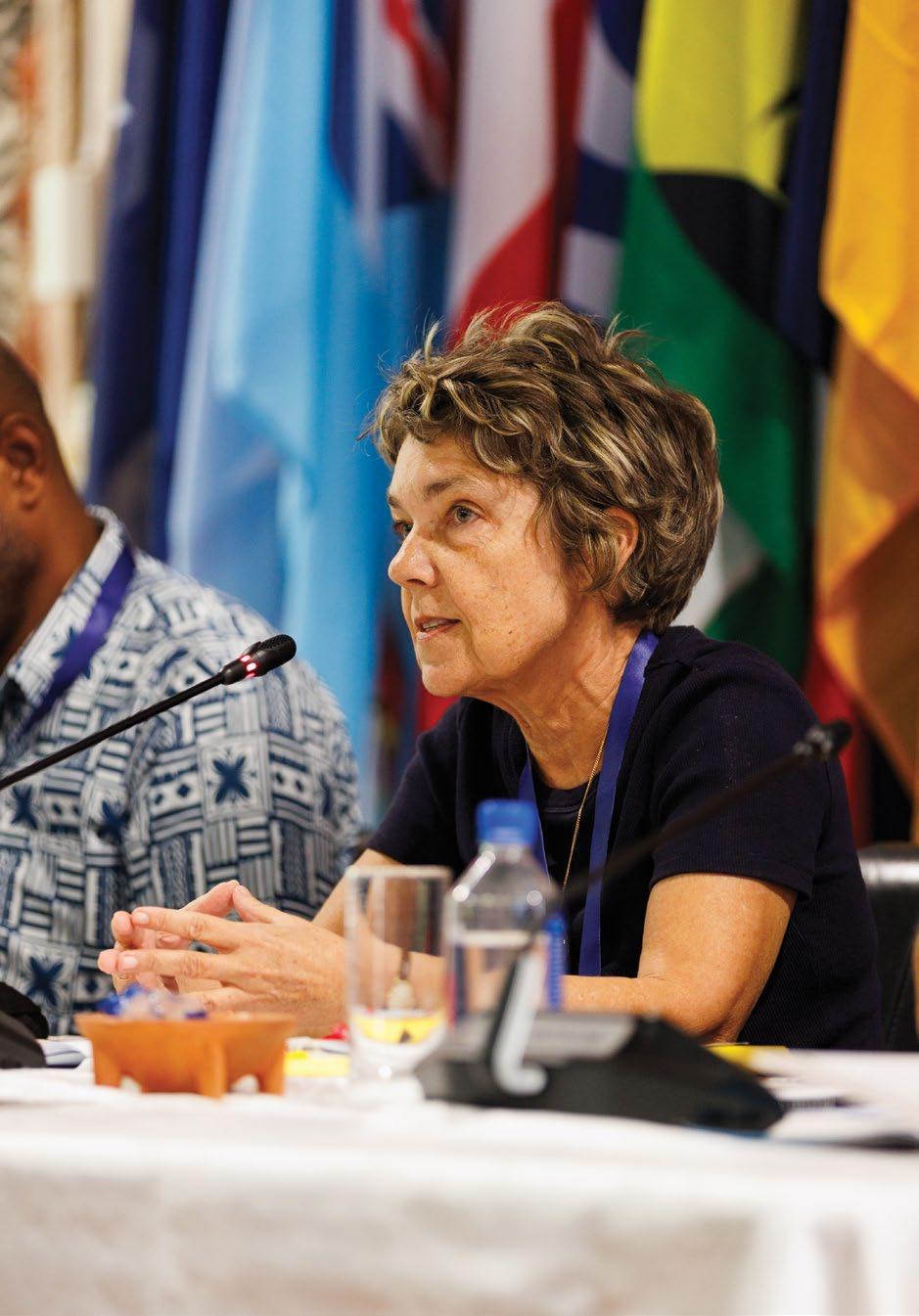

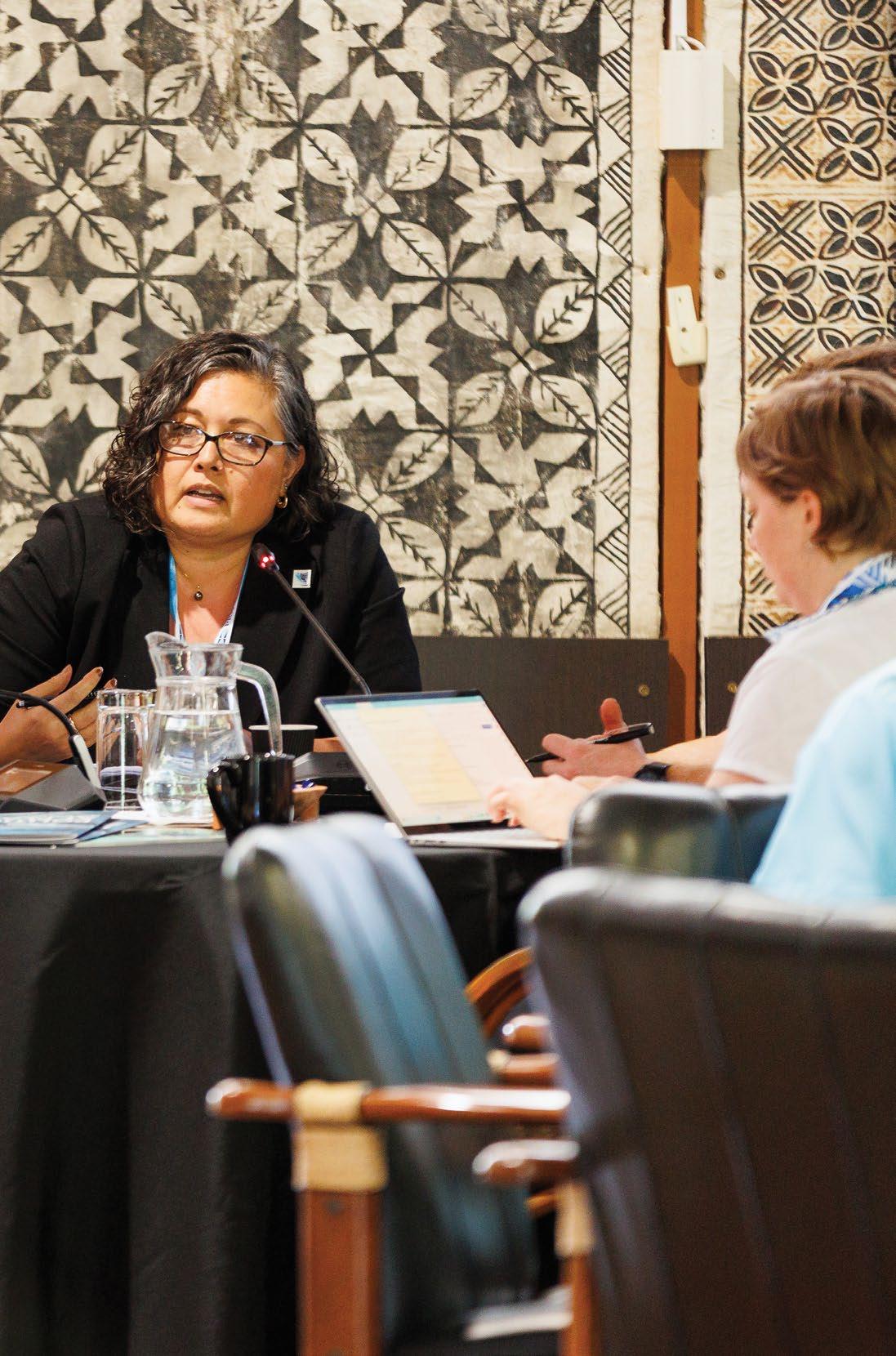
Still, major powers courting attention and seeking influence presented the region with an opportunity to collectively advance its own interests and priorities. But some participants worried individual Forum members, and the region collectively through the Forum and other institutions, were not well-placed to manage major power dynamics. The region had yet to articulate a coherent strategy for managing this challenge. Recent internal tensions meant the Forum had not been able to lead the Pacific’s management of geopolitical pressures.
Ultimately, the Forum needed to lead on consensus building so the Pacific could speak with one voice on global issues, as it had on nuclear non-proliferation and, more recently, climate change. It had an important role as a coordinator of support from donors, helping Forum members to meet donor obligations and getting maximum benefit from international cooperation.


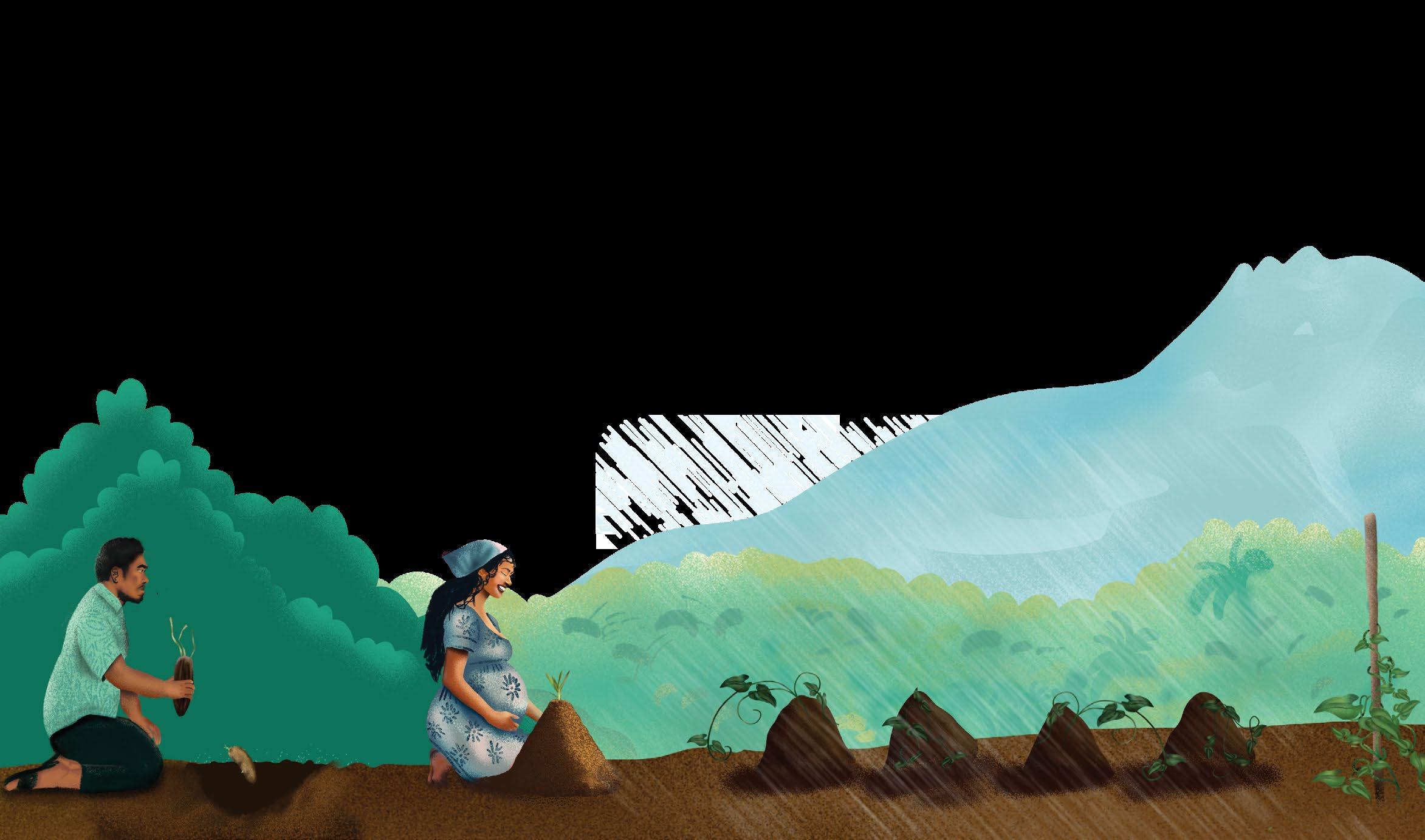
Visioning a Secure Future for the Blue Pacific Continent


In late June 2024, the inaugural Pacific Regional and National Security Conference was held in Suva, Fiji. The Conference brought together experts and representatives of the Pacific security community from all 18 Pacific Island Forum members .
The Conference was held with the common understanding that all Pacific communities can contribute to the peace, safety and prosperity of the region through cooperating and learning from each other. And it is this unity, cohesiveness and interdependence that will become increasingly necessary to addressing the urgent and complex challenges before the region .
The Futures Workshop, entitled ‘Visioning a Secure Future for the Blue Pacific Continent’, was a whole day session held on the Conference’s final day. The workshop was an invitation for conference participants to engage with a series of futures exercises and, in doing so, share the rich diversity of their own cultures and communities as well as listen to and connect with those of other participants. This was a valuable opportunity for exchange given that participants came from all corners of the Blue Pacific: across Melanesia, Polynesia and Micronesia .
The objectives of the workshop were to:
➢ explore and identify among Forum members a range of hopeful futures, including what those futures would look like for their respective families, villages, churches, communities, nations, regions, and the ocean itself
➢ explore and identify how to move towards those identified hoped -for futures, including potential practical steps to be taken, by whom, in what order/timeframe etc.
➢ look over the horizon and consider the intergenerational implications of the decisions and actions taken today;
➢ empower participants with the idea the future is not set but rather open to influence; and
➢ inform the Conference Statement with the major themes, ideas and actions identified during the workshop.
This report draws directly from participant contributions to the workshop that were collected and deidentified.
Like the yams that grow across many Forum members, the future needs careful planning and tending so we can all enjoy the harvest




Step One: participants were asked to consider the future they hoped for their children and grandchildren.
Step Two : Once a hoped -for future was imagined at a personal level, participants shared it with the other participants on their table. They were then asked to discuss and agree on 3 -5 key points shared across the visions and consider how this combined future would look at a community, national and regional level.



themes ‘What do you hope for 2050: for your children and grandchildren, their communities, nation and region?’
Cultural Security
➢ A thriving and enduring culture, confident and free from fear of harm or loss of knowledge
➢ A future generation rooted in tradition, with a sense of belonging and awareness of their role as cultural custodians
➢ A regional ‘Pasifika Voice’ grounded in shared cultural bonds, common goals and connections
National Security
➢ A peaceful, prosperous, educated, and healthy population
➢ Communities that are inclusive, equitable, empowered, supported by strong governance and rule of law, and led by community concerns
➢ Resilient rule of law, disaster preparedness, political systems, and supply chains
➢ Regional sovereignty and ability to determine our own future
Human Security
➢ A future generation with access to free education, nourishing food, cultural connections, and job prospects close to home
➢ Communities protected in their unity from illicit drugs and drug trafficking
➢ Well -funded mental health services
➢ Decisive leadership and legislation against transnational crime
➢ Migration with dignity, not forced by economic or environmental circumstance
Environmental Security
➢ A future generation able to live and fish in their ancestral homes, largely free of the existential threat of climate change
➢ A nuclear -free Pacific maintained
➢ Traditional and indigenous knowledge central to efforts to address regional impacts of climate change
➢ Healthy fish stocks, coordinated resource management
Development
➢ A future generation that can reach their full potential and prosper in the region with secure livelihoods
➢ Locally led and culturally informed development that allows traditional knowledge to co -exist and add value to adopted technologies
➢ An economic boom that does not come at the price of the environment, culture and traditions or regional peace
➢ There was one near -universal theme included in the hoped -for futures imagined by participants : a Blue Pacific Continent where people can still live and flourish despite the projected increasing impact of climate change.
➢ The hoped for futures of many participants also featured a heavy emphasis on maintaining cultural heritage and knowledge as central to personal, community and, national identities . Many participants expressed concern that culture was being lost or subsumed by external influences, like the adoption of technology and emigration. At a regional level, the emphasis on culture went beyond maintaining and to expanding its influence further into the future. There was a commonly expressed view of culture, specifically shared cultural mores and understanding, as a latent power that could supercharge and amplify a regional voice on the global stage.
➢ There were various views among participants on what actions could be taken in response to the growing influence of technology, particularly social media . Some participants leaned towards banning or eradicating social media while others viewed it more pragmatically as an opportunity to adopt and adapt, imbuing technology with local culture and traditional knowledge.
➢ The role of national actors in the hoped -for futures of participants was viewed predominantly through the lens of disaster preparedness and climate adaption or resilience-building . That said, many participants viewed the actions to be taken at the national level as ideally occurring in a circular loop with the communities they serve . Culturally driven and responsive national governance was commonly pointed to as the future ideal.
➢ On regionalism, there was some differing views on its role among participants . Some pointed to a perceived need in their hoped -for futures of ascendent state sovereignty and/or sub-regionalism rather than expanded regionalism. Others viewed regionalism as serving a narrow operational role, like coordinating resource management . When imagined in any larger role, participants frequently caveated regionalism as being a point for integration and solidarity but not at a significant cost to sovereignty . Given that participants were drawn from national security practitioners, it is not wholly surprising that these points of tension surfaced.
➢ In terms of development, the role of community and locally driven and informed initiatives was central to many participants vision of a hoped-for future. National governance was not pointed to in the development space, rather its role was limited to policy areas like technology adoption, resource management and infrastructure . Where these policy areas intersected with development, the focus among participants remained squarely on community responses.
Step Three : Table groups were asked to consider the potential impact of factors that could accelerate towards or away from the hoped for futures identified on their table. Groups were then asked to consider what over the next ten years could be an opportunity or challenge to reaching the desired futures.


‘What are the most significant challenges that could stop you achieving the hoped for future?’
Socio-Cultural
➢ Land and resource management issues as a driver for social tension, disunity, and isolationism
➢ Transnational crime as a driver for drug use, criminal activity, and corruption
➢ The breadth and multiplicity of human security challenges – from health funding, poor food options, to education, and regional brain drain
➢ Loss of culture and traditional knowledge
Technological
➢ Impact of social media intergenerational transfer of culture and traditional ways and knowledge
➢ Increased dependency on tech overlaid with increased risk of cyber threats and attacks
➢ Digitalisation fuelling existing inequities between the tech ‘haves’ and ‘have nots’
➢ Tech leading to a decrease in safety, opening the region up to bad actors
Economic
➢ Economic instability as a driver of resource exploitation, inflation, and opportunity multiplier for transnational crime
➢ Limited resources and funding, leading to food insecurity, infrastructure constraints, less ability to counter security threats
➢ Supply chain and connectivity issues as a threat to economic growth
➢ Lack of stable prospects fuelling labour mobility out of region
Environmental
➢ The multi -faceted, rolling and far-reaching impacts of climate change (rising sea levels, loss of biodiversity, more severe natural disasters)
➢ Implications of these impacts on environment, habitability, disaster preparedness, and migratory drivers
➢ Dwindling resources a threat to biosecurity and sustainable management
➢ Nuclear legacy issues and waste dumping
Political
➢ The playing out of geopolitics and strategic competition in negative ways for regional interests
➢ The potential for external influences to exploit and undermine the delicate balance between regional and sovereign power
➢ The cumulative impact of a lack of political will, capability and integrity among national and regional leaders
➢ Lack of regional unity, shared vision and coordination
➢ There was one near-universal challenge identified by participants: the combined potential for shortfalls in political will, capacity, capability and integrity to seriously undermine efforts to effectively respond to future challenges.
➢ The strength of leadership, both at state and regional levels, was identified by participants as a critical vulnerability point. Strength was understood to consist of a clear and ideally shared vision, underpinned by leadership that is transparent, informed, accountable, resistant to corruption, and acting for the greater good and stability of the nation and/or region .
➢ Alongside leadership issues, participants almost universally pointed to climate change as another ubiquitous and overarching challenge for the region. The increase in frequency and intensity of natural disasters was highlighted as a particular challenge given the region’s geography and capacity to invest in disaster preparedness .
➢ Participants drew out how challenges could intersect and create impacts beyond their own domain. No challenge should be considered in isolation to the broader system in which is exists. Participants pointed to examples like the way forward in technology adoption in the Pacific, which has the potential to exacerbate economic inequality and impact social stability and resourcing. Likewise, the combination of climate change with unsustainable resource management was viewed by many participants as an accelerant to socio-cultural issues scarcity, food security and cultural practice.
➢ The role and potency of geopolitics dynamics to shape the region was raised by many workshop participants. Geopolitics was largely viewed as a challenge rather than an opportunity due to its potential to negatively influence regional unity through increasing state competition. Participants acknowledged the balance between regional relationships and national sovereignty in particular could be tested, with external actors increasingly interested in exerting influence in the Pacific.
➢ Technology was viewed by many participants as possessing both huge challenges and potential for the region. Given the geography of the Blue Pacific Continent, there was an inherent dependency on technology and digital connectivity to do business with the world. This, participants saw, could create opportunities for increased commerce but also new vulnerabilities to state-based and transnational criminal actors. Another challenge identified in this domain was the potential for entrenched digital inequity, driven by uneven technological transfers from source-countries or the practice of transfers in exchange for political support.
‘What are the things that might boost and support you achieving the hoped for future?’
Socio-Cultural
➢ Harnessing the collective strength of the Blue Pacific Continent, both in the region and beyond. Working together and building solidarity
➢ Fostering Pacific solutions to Pacific issues
➢ Creating dialogue spaces (including in education) to foster cultural awareness and resilience
➢ Supporting the transfer of traditional knowledge, culture and language between generations
➢ Aiding the fast adoption of technology to maximise the benefits to region
➢ Co -developing the region’s cyber/digital space in a way that advances development while minimising threats
➢ Embracing technology in culturally sensitive and supportive ways
➢ Ensuring controls are in place during the adoption of tech/social media to mitigate negative social and cultural impacts
Economic
➢ Continuing to target strategic investment in Pacific communities
➢ Building in resilience to the region’s economy through the creation of a single currency and market diversification
➢ Finding ways to distribute communal wealth more equitably and sustainably
➢ Fostering economic prospects through international trade, free trade regimes and sustainable growth
Environmental
➢ Enhancing awareness of the environment and the centrality of sustainable management to the region’s future prosperity
➢ Encouraging greater regional collaboration to tackle climate change
➢ Promoting technological approaches to shared challenges like climate change and food security
➢ Modelling sustainable resource and land use
➢ Building climate resilient and adaptable communities
Political
➢ Promoting the ‘common’ wealth and shared destiny (“we all live in this ocean”) and extending this to regional politics in action
➢ Developing governance for a rules-based system
➢ Underpinning this system with legislation to deter the misuse of the region’s resources and geography
➢ Building national and regional preparedness
➢ Increasing information exchanges on regional challenges
➢ Opportunities lay in the region’s comparative strengths. Participants pointed to the strength inherent in Pacific-first approaches, grounded in culture. Other opportunities for steering towards the hoped for futures were seen in the continued sharing of traditional knowledge and drawing on the strength found in unity, when the region pulls together when faced with common threats and emerging trends.
➢ Political opportunities generated the most responses and ideas, with a reoccurring theme around the need to protect the rule of law. Many participants suggested the Pacific needs deeper cooperation, and regional integration , to lessen the burden of shared challenges. In short, there was a call for Pacific solutions to Pacific problems . Solutions could not fall upon single nations alone. To this end, the sociocultural strength of the Pacific was an opportunity to be harnessed.
➢ The notion of one village approaches to common problems was well received. Participants wanted smarter, coordinated security efforts – which would greatly benefit from better national and regional preparedness, cooperation and information sharing. This would increase capability and capacity for the region, prevent duplication and leverage each other’s strengths.
➢ Many participants highlighted the need for resilient economies, that could withstand the uncertainty taking place internationally. Expanded international trade, facilitated through free trade agreements with Pacific Island countries could sustainably boost economic growth . The creation of a single Pacific currency was drawn out, as a solution that would turn the Pacific into an economic bloc.
➢ Notwithstanding the significant environmental challenges faced by the Pacific, participants identified opportunities to safeguard regional resources, build adaptive climate resilient societies and use technology to address food security and other sustainability issues.

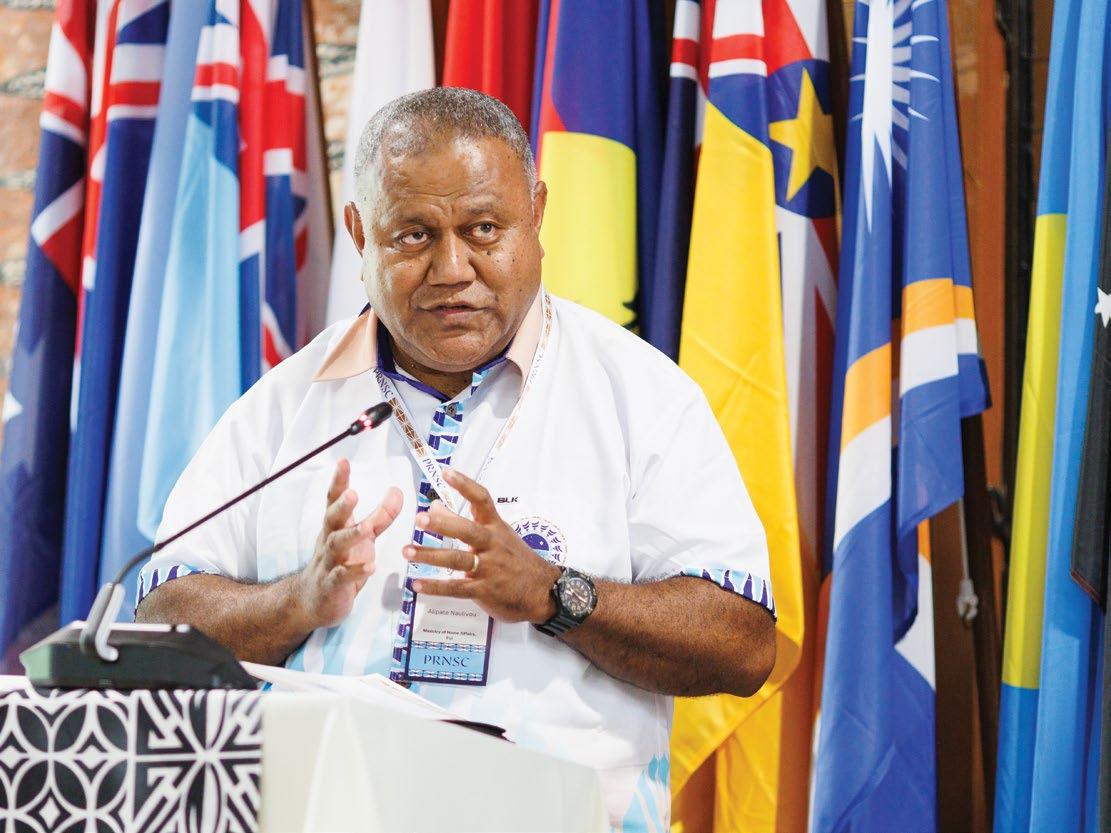

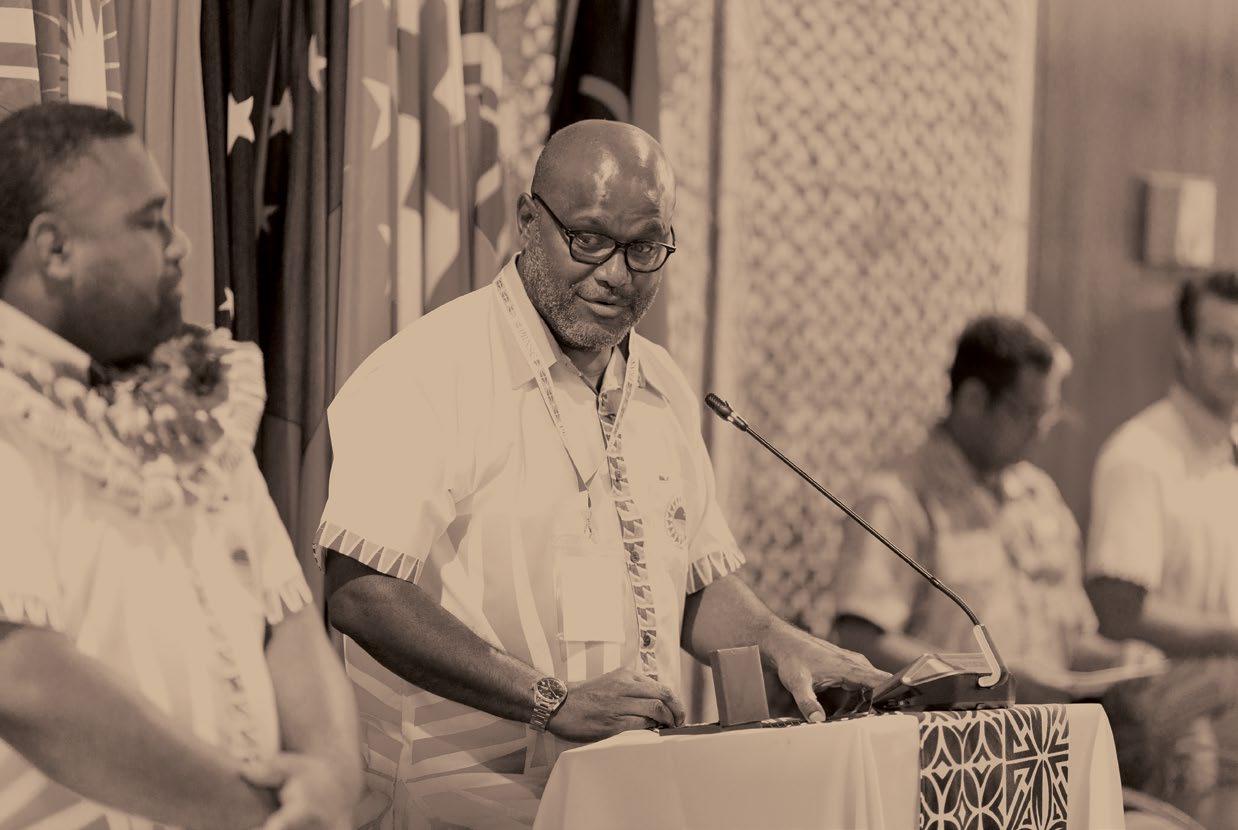






What
Pacific identities (culture, history and heritage, traditional values and knowledge, languages, faith)
Pacific voices (continued use of traditional institutions, structures, and customary laws)
Environment (protect the heritage of our lands and ocean, safeguarding for future generations)
Natural resources (sustainably manage the use of the region’s land and marine riches)
Sovereignty / self -governance (uphold cultural and national autonomy where possible)
Regional unity (the healthy balance between sovereignty with benefits of regional agreement)
Health and education (protect our elders, support our young people, invest in human potential)
Step Four : To consolidate, groups agreed 3 – 5 opportunities that Forum members are currently well -placed to take advantage of, and 3 – 5 barriers or challenges that could undermine achieving the identified desired futures.

Climate change (more extreme weather events, limited resilience and disaster preparedness for the new climate, loss of liveable land, degradation of natural resources and environment, rising sea levels)
Loss of Pacific identities (culture and traditional knowledge subsumed by tech, brain drain)
Technology risks (critical reliance on technology, cyber security, impact of social media )
Geopolitical tension (proxy conflicts, assertion of external power in region, divisive actions)
Transnational crime (undermining of rule of law, health impacts on local communities)
Pacific strengths (‘Pasifika Voice’, shared cultural and knowledge points, shared values and faith)
Natural resources (potential for more money flowing into region if managed sustainably)
Technology (if applied thoughtfully, tech could enable intergenerational knowledge gifting, digitise and preserve culture, create job prospects to keep people in the region, supercharge trade)
Geopolitics (create development opportunities through bilateral and multilateral partnerships)
Education (provide high quality universal education, informed by culture and traditional knowledge)
Step Five : Groups were asked to identify actions that could be taken over the next three years that would get them on the path towards the hopedfor future by either addressing potential challenges or taking advantage of potential opportunities.
Step Six : Groups then prioritised these actions based on impact and viability.

‘What can we do today to secure the future we want to live in?’
Actions suggested by participants sat in four categories.
1. Operational Actions: connect, coordinate, create, build.
2. Policy & Legal Actions: proactively engage, shift, develop, adapt.
3. Regional Actions: cooperate, restructure, unify.
4. Other Actions: increase, establish, maintain, cultivate, empower.

➢Connect regionally, across sectors and communities to understand the critical gaps to being future -ready and what actions are feasible or not to remedying these gaps.
➢Make coordinated efforts to strengthen existing regional architecture instead of creating new institutions. This could include promoting engagement and capacity building.
➢Conversely, establish and build on regional and national architecture where shortfalls exist . For some participants, this looked like all Pacific countries developing and implementing national security strategies.
➢Consider and agree on how national and regional budgets are to be accessed and allocated . This could include dedicating budget support for individual initiatives, ensuring access is equitable, finding ways to use innovative financing in climate change responses etc.
➢Build capacity in maritime security. This included clarifying and agreeing to regional definitions of maritime security and the role states. Some participants also saw a new body could accelerate and boost overall maritime domain awareness.
➢Working as a region on regional challenges . Participants suggested advocating for increased critical workforce capability investments (e.g. health and education), standardising initiatives, and adopting a united front to donors. Further actions under this regional cooperation umbrella included the sharing of resources and expertise, creation of information hubs on critical issues like countering transnational crime and establishing shared responsibility for designated budgets.
➢Address threats to democratic resilience. Participants pointed to a need to seek agreement and enforce among states stringent screening of personnel entering politics. A call was also made to increase dialogue on corruption and how it impacts society. There was also a call for greater expectations on Pacific leadership. The quality of leadership needs to be cultivated, with politicians expected to take oaths of ethical responsibility including the commitment to do good for all.
➢Foster inclusive community engagement in policy and programs through advocating for holistic, complementary and consensus -building approaches. Such an approach could be applied to the suggested action of a national ‘reuse, reduce, recycle’ policy. It could also be applied to efforts at alternative dispute resolution options for land disputes.
➢Work with donor partners to increase their capability and capacity at addressing regional issues in ways that account for potential cultural damage. Some participants stressed to achieve this, the region must firstly reflect on its own cultures, what development initiatives previously worked, and how these examples could inform future donor involvement in the region.
➢Actively diversify partnerships - no one agency (donor) can solve the complex problems the region faces. This could include seeking agreement on and raising awareness of what regional strategic positions are held and why. Participants also pointed to seeking targeted technical assistance for specific issues.
➢Strengthen the Pacific Fusion Centre’s capacity to deliver timely and insightful security assessments. Potential actions raised included broadening the Centre’s secondee network system and funding capacity to deliver more assessments.
➢Create a fuller picture of human security in the region . Invest in data collation and analysis through existing bodies, to surface figures on human security gaps and needs.
➢Facilitate climate change adaptation . Some participants encouraged the reclamation of land in high -risk PICs and including adaption in the education system. Other activities could be to increase consultation on resource exploration, invest in climate-resistant crop development, and protect critical infrastructure.
➢Integrate where possible. One example raised was integrating tech systems among broader agencies. Another was to integrate community policing with customary norms to ensure culturally informed practices.
➢Adopt tech while acting to protect people and infrastructure . Actions could include education campaigns on cyber safety and capacity building on cyber resilience and tech. Participants also suggested using tech to virtualise and preserve cultural heritage.
➢Strengthen regional responses from agencies . Another potential action was the implementation of more stringent conditions and consequences on Forum dialogue partners, such as requiring polluters to clean up if they want to do business with the Pacific.
➢Draw on traditional knowledge in MOUs and legislation. By developing a long-term approach to address climate change policies including the ratification and implementation of climate commitments into domestic law.
➢ Draw on traditional knowledge in MOUs and legislation . By developing a long -term approach to address climate change policies including the ratification and implementation of climate commitments into domestic law.
➢Develop adaptive legal instruments for sustainable management of the environment, society and security for the current context. This includes the pursuit of better governance, climate frameworks, health and wellbeing policies, strong and empowered anti -corruption and transnational crime initiatives and regional peace. Streamlined reform will ensure legislation reflects evolving trends.
➢ Develop adaptive legal instruments for sustainable management of the environment, society and security for the current context. This includes in the pursuit of better governance, climate frameworks, health and wellbeing policies, strong and empowered anti -corruption and transnational crime initiatives and regional peace. Streamlined reform will ensure legislation reflects evolving trends.
➢ Shift mindset from bilateral to multilateral engagement. Participants highlighted that Pacific problems require Pacific solutions. One suggestion was for states to work together more on creating a unified and stronger voice in multilateral and donor settings. Another suggestion was to build strong pacific partnerships and institutions to facilitate the sharing of legislation and policies among members as a way of strengthening regional systems.
➢Shift mindset from bilateral to multilateral engagement. Participants highlighted that Pacific problems require Pacific solutions. One suggestion was for states to work together more on creating a unified and stronger voice in multilateral and donor settings. Another suggestion was to build strong Pacific partnerships and institutions to facilitate the sharing of legislation and policies among members as a way of strengthening regional systems.
➢Create impact assessments for national security strategy/policy. Provide support to the PIF’s Transnational Organised Crime Framework through identifying legal gaps and opportunities for action. Churches were also deemed critical by many participants to shifting mindsets and building selfreliance. As such, their role and how to draw them into work on human security needs to be considered. Participants also perceived that Forum members needed to adhere to international laws, particularly those that protected human rights.
➢Proactively engage with new technologies . Develop regulatory bodies on cyber, AI and digital currencies and facilitate human rights governance for digital transformation.
➢ Create impact assessments for national security strategy/policy. Provide support to the PIF’s Transnational Organised Crime Framework through identifying legal gaps and opportunities for action. Churches were also deemed critical by many participants to shifting mindsets and building self -reliance. As such, their role and how to draw them into work on human security needs to be considered. Participants also perceived that PIF member states need adhered to international laws, particularly those that protected human rights.
➢Protect customary land ownership, through the analysis of current legislation. Renew and amend land legislation to improve and provide clarity i.e. incorporate mediation.
➢ Proactively engage with new technologies . Focus on developing regulatory bodies on cyber, AI and digital currencies and facilitate human rights governance for digital transformation.
➢ Protect customary land ownership , through the analysis of current legislation. Renew and amend land legislation to improve and provide clarity i.e. incorporate mediation.
➢Create a Pacific Voice to address geopolitical pressures and speak as one when engaging with international institutions and non-state actors. Participants suggested a Pacific Voice would improve coordination, cooperation, collaboration, integration, and harmonisation. The idea would be to tackle the problem, not the symptom. Participants also raised the canvassing of geopolitical challenges in the updated Boe Action Plan.
➢Develop a common currency, common passport or regional ID for ease of travel and to drive greater connectivity through an increase in connecting flights within the region.
➢Create a formal regional platform that extends national work into the regional context. This could look like information sharing underpinned by partnerships and MOUs. It would see a coordinated approach to regional security that builds consensus capabilities and builds enforcement. The creation of regional action plans, and the harmonisation of legislation will better leverage shared Pacific resources, skills and expertise.
➢Greater cooperation to fight shared concerns and increase regional and sub -regional advocacy efforts. This could include a regional response team to respond to civil unrest and disasters. Mainstreaming approaches on issues like traditional and climate security threats could amplify regional efforts and outcomes. This could be further amplified where a consistent view and position is held across all agencies and industry.
➢Review and restructure existing treaty mechanisms to efficiently delegate issues to relevant agencies . PIF could take an enhanced role in strengthening existing mechanisms, e.g. Rarotonga Treaty and Bikefawa. Optimising Pacific security architecture would also leverage work underway at the PIF. To this end, national security coordinators and advisors must maintain and step up the monthly dialogue facilitated by the Fusion Centre.
➢Maintain and cultivate a consensus -based approach to complex problems. Participants raised this in relation to connectivity and technology transfer, which they viewed as a point to be managed through the Forum. With the establishment of joint operations centres, regional issues like climate change could be handled by way of a regional approach and joint responses to weather events.
➢Establish a regional cultural ‘tattoo’ (similar to the Edinburgh Tattoo) to showcase the Pacific. Such an event would protect culture and Pacific identity, create linkages between communities, and support academic studies on culture. The ‘tattoo’ could be an extension of existing events that celebrate Pacific culture ( PacGames and PacFest). Another action suggested here was greater integration of Pacific countries into regional sport networks.
➢Reinforce a self-affirming narrative of culturally grounded and clear identity. Many participants called for active consideration of shared goals that underpin Pacific agency and ways.
➢Empower communities to strengthen societal resilience . Actions suggested here included formal registration networks for communities as well as creating mechanisms to better mobilise through volunteering.
➢Increased provision of development support from key Pacific partners. Actions here could include a focus on donor assistance to replace existing resources.
➢Establish a Pacific-wide education qualification framework . Actions suggested here included an increase in scholarships and education opportunities into partner countries. Any actions need to ensure remittances continue to flow from overseas.

Step Seven: Participants had the opportunity to reflect on the conference and futures workshop and asked to consider what they could do on an individual level.
The Pacific leaders who introduced sessions throughout the workshop led a storytelling reflection.



We hope this report serves as a record of the day but also sparks continued conversation across the Blue Pacific Continent. The future is not set. Rather, it is influenced by the seeds – the actions or inactions - we sow today. It is in our hands to actively tend to the hopeful buds and, in doing so, contribute to the bountiful harvests of tomorrow.

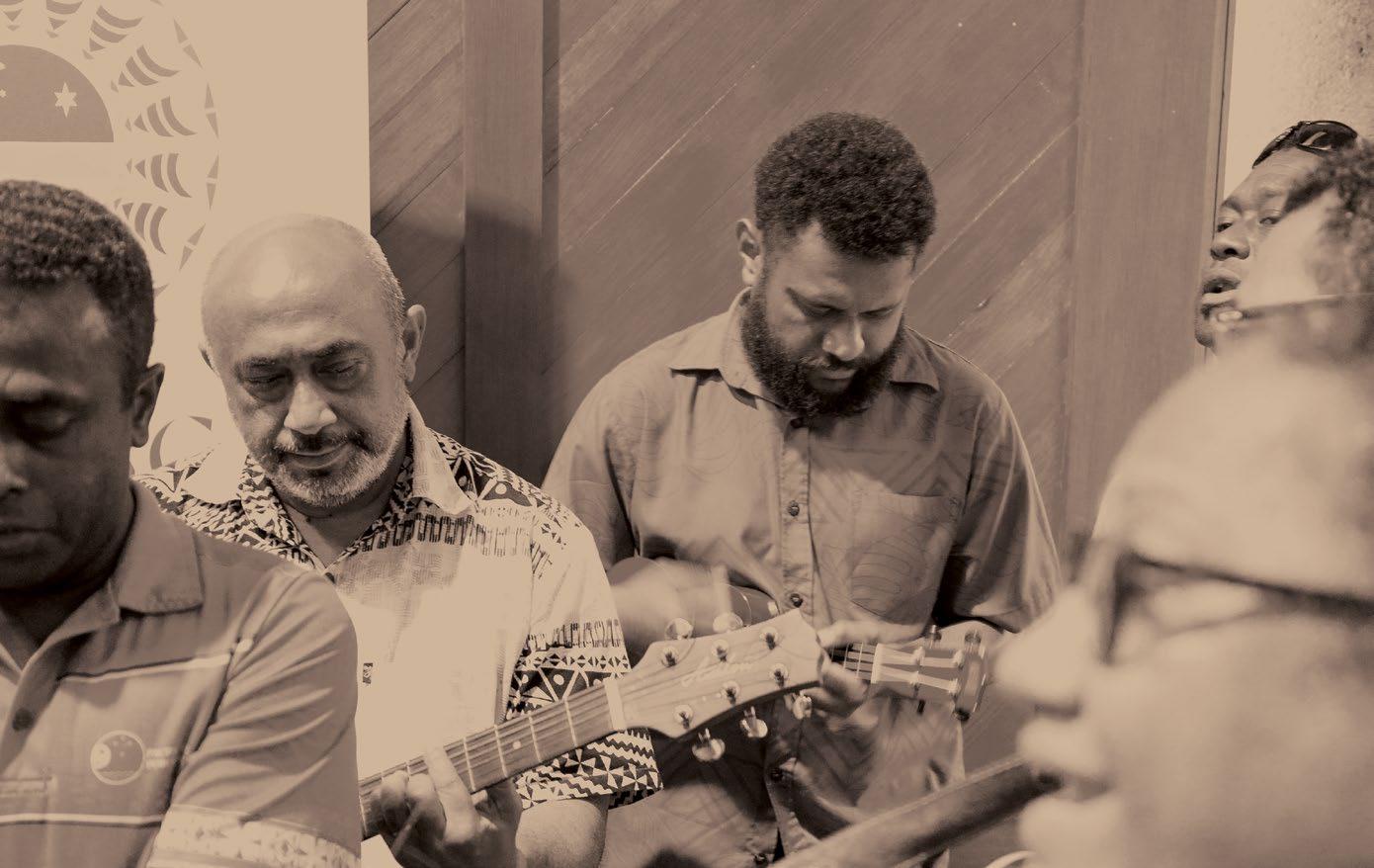


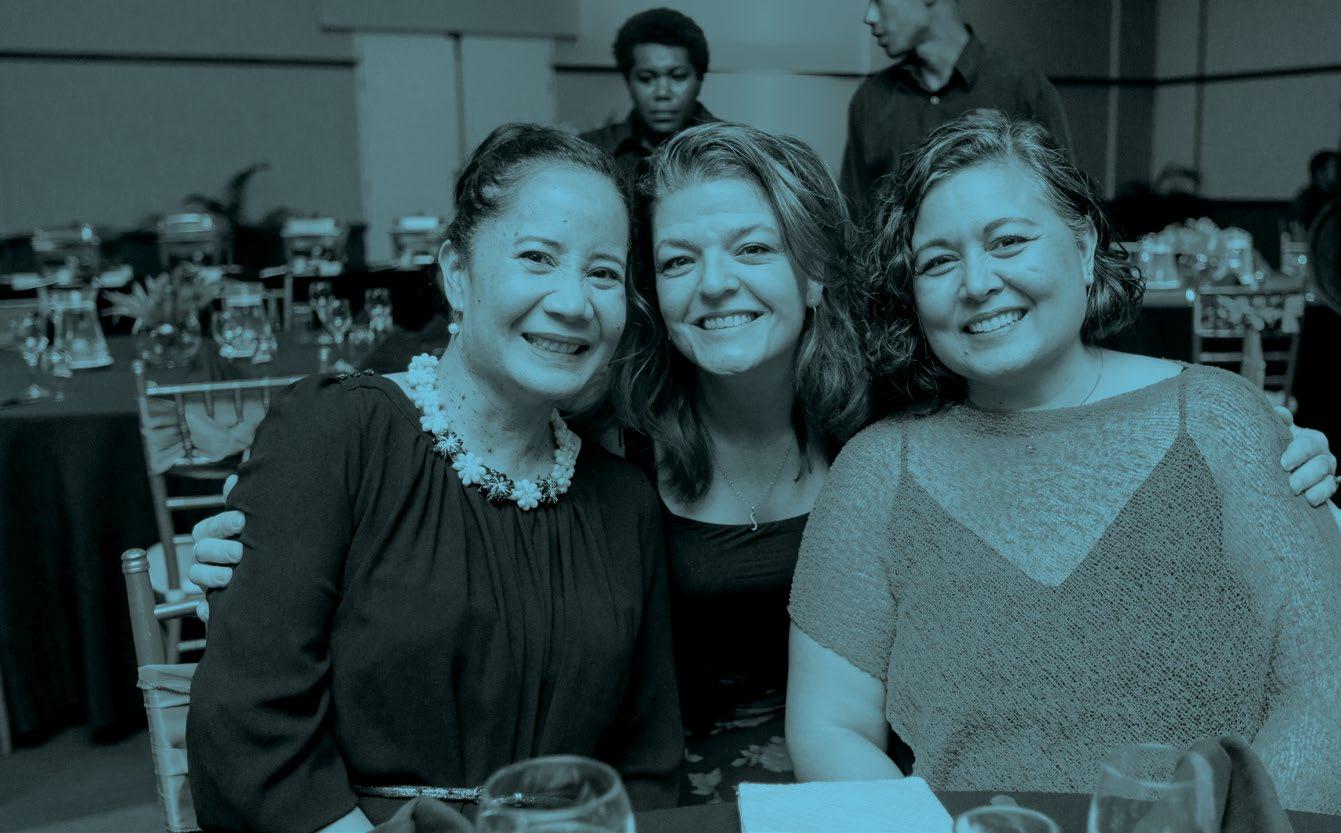









24–26
JUNE 2024